Political Communication Research Paper Topics

- Agenda Building
- Bandwagon Effect
- Candidate Image
- Deliberative Polls
- Deliberativeness in Political Communication
- E-Democracy
- Election Campaign Communication
- Election Polls and Forecasts
- Fragmentation of Public Sphere
- Horse Race Coverage
- Issue Management in Politics
- Issue Voting
- Media as Political Actors
- Media Democracy
- Media Diplomacy
- Media Events and Pseudo-Events
- Media Logic
- Mediated Populism
- Mediated Terrorism
- Mediatization of Politics
- Negative Campaigning
- News as Discourse
- Party Political Communication
- Party–Press Parallelism
- Personalization of Campaigning
- Politainment
- Political Advertising
- Political Cognitions
- Political Communication Culture
- Political Communication Systems
- Political Consultant
- Political Cynicism
- Political Discourse
- Political Efficacy
- Political Knowledge
- Political Language
- Political Marketing
- Political Media Use
- Political News
- Political Personality in Media Democracy
- Political Persuasion
- Political Socialization through the Media
- Political Symbols
- Polls and the Media
- Populism and Responsiveness
- Public Interest
- Public Opinion
- Public Sphere
- Quality Criteria in Political Media Content
- Spin Doctor
- Symbolic Politics
- Televised Debates
- Underdog Effect

The Communication of Politics
In spite of impressive modernization trends, including, for example, the growing importance of visual communication, most of the discourse among political actors is still language based. Political elites use language for strategic purposes such as building a positive image, winning public support, or establishing specific perspectives for evaluation. On the other hand, language serves citizens to make sense of politics, form opinions, and take political decisions.
Academic Writing, Editing, Proofreading, And Problem Solving Services
Get 10% off with 24start discount code.
The mass media play a pivotal role in making the political discourse open to the public. Mass media select, process, and transmit political news and current affairs content. For ordinary citizens and even for political decision-makers, media coverage of politics is the most relevant and quite often the only source of information about current events.
By providing a platform for the public debate of political issues, the media construct a public sphere, that is, an open realm for the exchange of information and opinions among diverse political actors. However, according to Habermas (2006), the dynamics of public communication may be impaired by dominating powerful actors of the political center and by deficiencies of the media system, namely commercialization tendencies and connections with special interest groups.
Rather than confining their role to functioning as intermediaries, i.e., serving the information and publication needs of all groups in society, the media themselves have become powerful political actors, sometimes referred to as the fourth estate. Media organizations pursue policy objectives, for example, by expressing specific partisan opinions, by endorsing the interests of certain societal groups, or by legitimizing the views of those in power. This may have consequences for the balance of power among the classical political estates – legislative, executive, and judiciary – and thus raises questions concerning the definition of media freedom and mechanisms of media control.
Political Media Use and Effects
The evolution of mass media has brought about contradictory results as to citizens’ exposure to political information. On the one hand, due to a number of 24-hour news networks on radio and television and, in addition, a plethora of Internet news pages, the sheer volume of available political information has proliferated immensely. On the other hand, many mainstream broadcasters and newspapers have reduced their hard news coverage, especially foreign affairs reporting, and have instead extended the supply of entertaining content, soft news, and infotainment formats. This goes along with shrinking audiences for serious newspapers and public affairs programs in many countries. While politically attentive citizens benefit enormously from the enriched political media menu, particularly of the Internet, the majority audience seems to be content with being informed just about the most salient issues.
Television is still the main source of information about politics for the average citizen, though digital media are continuously gaining ground, particularly among the younger generation. A high correlation of political media use with certain demographic factors is responsible for large differences in the reach of political news and in citizens’ acquisition of political information. In all countries those who have a higher income, who are better educated, and who are more strongly interested in politics are the most attentive to political information. However, due to blurring lines between hard news, soft news, and light entertainment in some mass media, there is also a chance that politically inattentive citizens are unwittingly exposed to mediated politics.
As the study of mass communication is generally based on the premise of media effects, it is also a central presumption of political communication research that the media have a significant impact on politics (Graber 2005). A broad field of communication research is devoted to examining the influence of news and information on cognitions and attitudes. Another strand of research looks at influence processes in campaign contexts, for example in health campaigns, in political information campaigns, in social marketing campaigns, and most often in election campaigns.
As distinct from such rather pragmatic approaches to media effectiveness, there is a broad field of political communication research with a critical or pessimistic orientation that starts from the more or less explicit assumption that mass communication may have negative implications for democratic citizenship and for the political system as a whole. Among the harmful media effects that have been hypothesized are eroding trust in political institutions and political cynicisms.
Political Communication and Research in Flux
The advent of the Internet and other new media has removed some of the constraints that traditional media have imposed on communication processes. Because of the enormous increase in content diversity, citizens can choose according to their individual political preferences among an excessive variety of channels and media products. Bennett and Iyengar (2008) envisage a “new era of minimal effects” resulting from eroding media influences as audiences dissolve into increasingly self-selected segments. On the other hand, while audience members can select more freely, the traditional mass media are losing some of their gatekeeping and filtering functions. Thanks to the new communication technologies, citizens can easily bypass the mass media and disseminate messages via weblogs or Internet platforms such as YouTube, or in direct person-to-person networking. The new media enhance both mediated expressions of political opinion and personal political interaction.
Considerable political communication research attention is directed toward civic engagement. The label refers to research that tests the presumed (mal)functioning of mass media for political participation. Research on civic engagement includes studies with an explicit orientation to normative criteria, especially to standards derived from theories of democracy. A continuing theme in this field of research is the relationship between entertainment media and political engagement (see, e.g., Delli Carpini 2012).
References:
- Bennett, W. L. & Iyengar, S. (2008). A new era of minimal effects? The changing foundations of political communication. Journal of Communication, 58, 707–731.
- Delli Carpini, M. X. (2012). Entertainment media and the political engagement of citizens. In H. A. Semetko & M. Scammell (eds.), The Sage handbook of political communication. Thousand Oaks, CA: Sage, pp. 9–21.
- Gerstlé, J. (2008). La communication politique, 2nd edn. Paris: Armand Colin.
- Graber, D. A. (2004). Mediated politics and citizenship in the twenty-first century. Annual Review of Psychology, 55, 545–571.
- Graber, D. A. (2005). Political communication faces the 21st century. Journal of Communication, 55, 479–507.
- Habermas, J. (2006). Political communication in media society: Does democracy still enjoy an epistemic dimension? The impact of normative theory on empirical research. Communication Theory, 16, 411–426.
- Kaid, L. L., & Holtz-Bacha, C. (eds.) (2008). Encyclopedia of political communication. Thousand Oaks, CA: Sage.
- Mazzoleni, G. (2004). La comunicazione politica. Bologna: Il Mulino.
- Mazzoleni, G. & Schulz, W. (1999). “Mediatization” of politics: A challenge for democracy? Political Communication, 16, 247–261.
Back to Communication Research Paper Topics .
ORDER HIGH QUALITY CUSTOM PAPER

Research in Political Communication
Main navigation.
The Communication Department is home to the world’s leading scholars studying political communication. The area focuses on how communication and media affect political attitudes and behaviors, as well as what communication reveals about the workings of political institutions and political systems. The area is also known for its innovation in research methods and focus on scientific inference.
James Fishkin directs the Center for Deliberative Democracy , devoted to research and applications of Deliberative Polling, a method of public consultation for engaging representative and informed opinion on policy issues. The center has collaborated on projects in more than 24 countries.
James Hamilton directs the Journalism Program . His research focuses on the economics of news, including the effects of market failures on reporting, the relationship between income and information, and computational journalism.
Shanto Iyengar directs the Political Communication Laboratory , which focuses on the role of mass media in democratic societies. Much of his work uses experimental methods to measure the causal effects of news media and mass communication on political opinion and behavior.
Jon Krosnick directs the Political Psychology Research Group , which focuses on (1) the effects of political communication on attitude formation, change, and impact, and (2) optimizing methods of survey research in order to study political cognition and action.
Jennifer Pan’s research focuses on revealing the political choices and outcomes of non-democratic societies through their patterns of communication and information control using computational and experimental methods.
Faculty — Political Communication
Postdoctoral Scholars — Political Communication
Doctoral Students — Political Communication
Selected Graduates
- Yingdan Lu, Ph.D. 2023. Assistant Professor, School of Communication, Northwestern University
- Adina Abeles, Ph.D. 2020. Quantitative Social Scientist, Chan Zuckerberg Initiative
- Kaiping Chen , Ph.D. 2019. Assistant Professor, Communication Department, University of Wisconsin-Madison
- Kaiping Zhang , Ph.D. 2017. Assistant Professor, Tsinghua University, Beijing
- Sean Westwood , Ph.D. 2014, Assistant Professor of Government, Dartmouth College
- Nuri Kim , Ph.D. 2013. Associate Professor, School of Communication, Nanyang Technological University, Singapore
- Yphtach Lelkes , Ph.D. 2012, Associate Professor, Annenberg School for Communication, University of Pennsylvania
- Michael Weiksner , Ph.D. 2010, General Partner, Rostrum Capital
- Alice Siu , Ph.D. 2009, Associate Director, Stanford Center for Deliberative Democracy
- Philip Garland , Ph.D. 2008. Vice President, Data Science, Snap! Raise
- Daniel Schneider , Ph.D. 2008. Freelance Consultant, Berlin, Germany
- Brett Bannon , Ph.D. 2008, Founder, LearnRig
- Kyu Hahn , Ph.D. 2006, Associate Professor of Communication, Seoul National University
- Markus Prior , Ph.D. 2003, Associate Professor of Politics and Public Affairs, Princeton University
- Hye-Ryeon Lee , Ph.D. 2000, Associate Dean, College of Arts and Humanities, University of Hawaii
- Michael McDevitt , Ph.D. 1998, Professor, University of Colorado at Boulder
- Diana Mutz , Ph.D. 1988, Samuel A. Stouffer Professor of Political Science and Communication, University of Pennsylvania
- Vincent Price , Ph.D. 1987, President, Duke University, where he is also Walter Hines Page Professor of Public Policy and Political Science in the Sanford School of Public Policy and Trinity College of Arts and Sciences
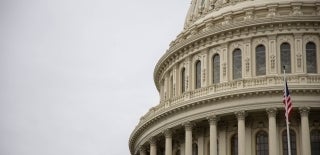
- Research Areas
Political Communication
Politics depends heavily on communication among and between political elites, the media, and citizens. Scholars at Annenberg examine the role of interpersonal and mass-mediated communication on the attitudes, opinions, information-processing, and behavior of citizens, political elites, political institutions, and political systems.
Photo Credit: Joshua Sukoff / Unsplash

Abortion, Not Inflation, Directly Affected Congressional Voting in 2022
Contrary to the conventional wisdom that Americans are “pocketbook voters,” views on abortion and the Supreme Court are more likely to sway voters today.

Annenberg Public Policy Center Celebrates 30 Years of Research and Engagement That Matter

The Majority of Americans Do Not Support Anti-Democratic Behavior, Even When Elected Officials Do

‘Politicians in Robes’: How a Sharp Right Turn Imperiled Trust in the Supreme Court

The YouTube Algorithm Isn’t Radicalizing People

Dolores Albarracín, Ph.D.

Murali Balaji, Ph.D.

Eran Ben-Porath, Ph.D.

Dwayne Booth

Riana M. Brown, Ph.D.

Xanni Brown, Ph.D.

Michael X. Delli Carpini, Ph.D.

Stephanie L. DeMora, Ph.D.

David Eisenhower, J.D.

Emily Falk, Ph.D.

Bita Fayaz-Farkhad, Ph.D.

Deen Freelon, Ph.D.
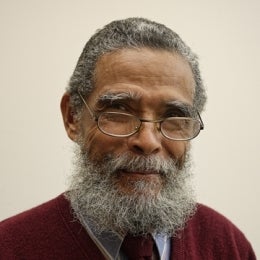
Oscar H. Gandy, Jr., Ph.D.

Sandra González-Bailón, Ph.D.

Daniel J. Hopkins, Ph.D.
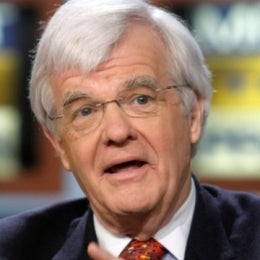
Albert R. Hunt

Sarah J. Jackson, Ph.D.

Kathleen Hall Jamieson, Ph.D.
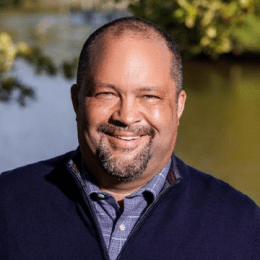
Benjamin Todd Jealous

Malav Kanuga, Ph.D.

Alon P. Kraitzman, Ph.D.

Yphtach Lelkes, Ph.D.

Matthew Levendusky, Ph.D.
Yue Li, Ph.D.

Marjorie Margolies

Carolyn Marvin, Ph.D.

Danaë Metaxa, Ph.D.

Diana C. Mutz, Ph.D.

Wazhmah Osman, Ph.D.

Gavin Ploger, Ph.D.

Vincent Price, Ph.D.

Scott Reich, J.D.

Yoel Roth, Ph.D.

Craig Snyder

Philip Tetlock, Ph.D.
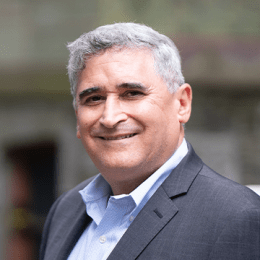
Ken Winneg, Ph.D.

Guobin Yang, Ph.D.

Tukufu Zuberi, Ph.D.
Graduate students.

Chloe (Jae-Kyung) Ahn

Kinjal Dave

Nicholas Dias

Timothy Dennys Steven Dorr

Tom W. Etienne

Vishwanath E.V.S.

Neil Fasching

Emilie Grybos

Helene Langlamet, Ph.D.

Tyler Leigh

Kirsten O. Lydic

Lizzie Martin

Adetobi Moses

Devo Probol

Yingchuan Qu

Farrah Rahaman

Shane Sheehy

Alex Tolkin

Natasha Williams

- Search Menu
- Browse content in Arts and Humanities
- Browse content in Archaeology
- Anglo-Saxon and Medieval Archaeology
- Archaeological Methodology and Techniques
- Archaeology by Region
- Archaeology of Religion
- Archaeology of Trade and Exchange
- Biblical Archaeology
- Contemporary and Public Archaeology
- Environmental Archaeology
- Historical Archaeology
- History and Theory of Archaeology
- Industrial Archaeology
- Landscape Archaeology
- Mortuary Archaeology
- Prehistoric Archaeology
- Underwater Archaeology
- Urban Archaeology
- Zooarchaeology
- Browse content in Architecture
- Architectural Structure and Design
- History of Architecture
- Residential and Domestic Buildings
- Theory of Architecture
- Browse content in Art
- Art Subjects and Themes
- History of Art
- Industrial and Commercial Art
- Theory of Art
- Biographical Studies
- Byzantine Studies
- Browse content in Classical Studies
- Classical History
- Classical Philosophy
- Classical Mythology
- Classical Literature
- Classical Reception
- Classical Art and Architecture
- Classical Oratory and Rhetoric
- Greek and Roman Epigraphy
- Greek and Roman Law
- Greek and Roman Papyrology
- Greek and Roman Archaeology
- Late Antiquity
- Religion in the Ancient World
- Digital Humanities
- Browse content in History
- Colonialism and Imperialism
- Diplomatic History
- Environmental History
- Genealogy, Heraldry, Names, and Honours
- Genocide and Ethnic Cleansing
- Historical Geography
- History by Period
- History of Emotions
- History of Agriculture
- History of Education
- History of Gender and Sexuality
- Industrial History
- Intellectual History
- International History
- Labour History
- Legal and Constitutional History
- Local and Family History
- Maritime History
- Military History
- National Liberation and Post-Colonialism
- Oral History
- Political History
- Public History
- Regional and National History
- Revolutions and Rebellions
- Slavery and Abolition of Slavery
- Social and Cultural History
- Theory, Methods, and Historiography
- Urban History
- World History
- Browse content in Language Teaching and Learning
- Language Learning (Specific Skills)
- Language Teaching Theory and Methods
- Browse content in Linguistics
- Applied Linguistics
- Cognitive Linguistics
- Computational Linguistics
- Forensic Linguistics
- Grammar, Syntax and Morphology
- Historical and Diachronic Linguistics
- History of English
- Language Acquisition
- Language Evolution
- Language Reference
- Language Variation
- Language Families
- Lexicography
- Linguistic Anthropology
- Linguistic Theories
- Linguistic Typology
- Phonetics and Phonology
- Psycholinguistics
- Sociolinguistics
- Translation and Interpretation
- Writing Systems
- Browse content in Literature
- Bibliography
- Children's Literature Studies
- Literary Studies (Asian)
- Literary Studies (European)
- Literary Studies (Eco-criticism)
- Literary Studies (Romanticism)
- Literary Studies (American)
- Literary Studies (Modernism)
- Literary Studies - World
- Literary Studies (1500 to 1800)
- Literary Studies (19th Century)
- Literary Studies (20th Century onwards)
- Literary Studies (African American Literature)
- Literary Studies (British and Irish)
- Literary Studies (Early and Medieval)
- Literary Studies (Fiction, Novelists, and Prose Writers)
- Literary Studies (Gender Studies)
- Literary Studies (Graphic Novels)
- Literary Studies (History of the Book)
- Literary Studies (Plays and Playwrights)
- Literary Studies (Poetry and Poets)
- Literary Studies (Postcolonial Literature)
- Literary Studies (Queer Studies)
- Literary Studies (Science Fiction)
- Literary Studies (Travel Literature)
- Literary Studies (War Literature)
- Literary Studies (Women's Writing)
- Literary Theory and Cultural Studies
- Mythology and Folklore
- Shakespeare Studies and Criticism
- Browse content in Media Studies
- Browse content in Music
- Applied Music
- Dance and Music
- Ethics in Music
- Ethnomusicology
- Gender and Sexuality in Music
- Medicine and Music
- Music Cultures
- Music and Religion
- Music and Media
- Music and Culture
- Music Education and Pedagogy
- Music Theory and Analysis
- Musical Scores, Lyrics, and Libretti
- Musical Structures, Styles, and Techniques
- Musicology and Music History
- Performance Practice and Studies
- Race and Ethnicity in Music
- Sound Studies
- Browse content in Performing Arts
- Browse content in Philosophy
- Aesthetics and Philosophy of Art
- Epistemology
- Feminist Philosophy
- History of Western Philosophy
- Metaphysics
- Moral Philosophy
- Non-Western Philosophy
- Philosophy of Science
- Philosophy of Language
- Philosophy of Mind
- Philosophy of Perception
- Philosophy of Action
- Philosophy of Law
- Philosophy of Religion
- Philosophy of Mathematics and Logic
- Practical Ethics
- Social and Political Philosophy
- Browse content in Religion
- Biblical Studies
- Christianity
- East Asian Religions
- History of Religion
- Judaism and Jewish Studies
- Qumran Studies
- Religion and Education
- Religion and Health
- Religion and Politics
- Religion and Science
- Religion and Law
- Religion and Art, Literature, and Music
- Religious Studies
- Browse content in Society and Culture
- Cookery, Food, and Drink
- Cultural Studies
- Customs and Traditions
- Ethical Issues and Debates
- Hobbies, Games, Arts and Crafts
- Lifestyle, Home, and Garden
- Natural world, Country Life, and Pets
- Popular Beliefs and Controversial Knowledge
- Sports and Outdoor Recreation
- Technology and Society
- Travel and Holiday
- Visual Culture
- Browse content in Law
- Arbitration
- Browse content in Company and Commercial Law
- Commercial Law
- Company Law
- Browse content in Comparative Law
- Systems of Law
- Competition Law
- Browse content in Constitutional and Administrative Law
- Government Powers
- Judicial Review
- Local Government Law
- Military and Defence Law
- Parliamentary and Legislative Practice
- Construction Law
- Contract Law
- Browse content in Criminal Law
- Criminal Procedure
- Criminal Evidence Law
- Sentencing and Punishment
- Employment and Labour Law
- Environment and Energy Law
- Browse content in Financial Law
- Banking Law
- Insolvency Law
- History of Law
- Human Rights and Immigration
- Intellectual Property Law
- Browse content in International Law
- Private International Law and Conflict of Laws
- Public International Law
- IT and Communications Law
- Jurisprudence and Philosophy of Law
- Law and Politics
- Law and Society
- Browse content in Legal System and Practice
- Courts and Procedure
- Legal Skills and Practice
- Primary Sources of Law
- Regulation of Legal Profession
- Medical and Healthcare Law
- Browse content in Policing
- Criminal Investigation and Detection
- Police and Security Services
- Police Procedure and Law
- Police Regional Planning
- Browse content in Property Law
- Personal Property Law
- Study and Revision
- Terrorism and National Security Law
- Browse content in Trusts Law
- Wills and Probate or Succession
- Browse content in Medicine and Health
- Browse content in Allied Health Professions
- Arts Therapies
- Clinical Science
- Dietetics and Nutrition
- Occupational Therapy
- Operating Department Practice
- Physiotherapy
- Radiography
- Speech and Language Therapy
- Browse content in Anaesthetics
- General Anaesthesia
- Neuroanaesthesia
- Browse content in Clinical Medicine
- Acute Medicine
- Cardiovascular Medicine
- Clinical Genetics
- Clinical Pharmacology and Therapeutics
- Dermatology
- Endocrinology and Diabetes
- Gastroenterology
- Genito-urinary Medicine
- Geriatric Medicine
- Infectious Diseases
- Medical Toxicology
- Medical Oncology
- Pain Medicine
- Palliative Medicine
- Rehabilitation Medicine
- Respiratory Medicine and Pulmonology
- Rheumatology
- Sleep Medicine
- Sports and Exercise Medicine
- Clinical Neuroscience
- Community Medical Services
- Critical Care
- Emergency Medicine
- Forensic Medicine
- Haematology
- History of Medicine
- Browse content in Medical Dentistry
- Oral and Maxillofacial Surgery
- Paediatric Dentistry
- Restorative Dentistry and Orthodontics
- Surgical Dentistry
- Browse content in Medical Skills
- Clinical Skills
- Communication Skills
- Nursing Skills
- Surgical Skills
- Medical Ethics
- Medical Statistics and Methodology
- Browse content in Neurology
- Clinical Neurophysiology
- Neuropathology
- Nursing Studies
- Browse content in Obstetrics and Gynaecology
- Gynaecology
- Occupational Medicine
- Ophthalmology
- Otolaryngology (ENT)
- Browse content in Paediatrics
- Neonatology
- Browse content in Pathology
- Chemical Pathology
- Clinical Cytogenetics and Molecular Genetics
- Histopathology
- Medical Microbiology and Virology
- Patient Education and Information
- Browse content in Pharmacology
- Psychopharmacology
- Browse content in Popular Health
- Caring for Others
- Complementary and Alternative Medicine
- Self-help and Personal Development
- Browse content in Preclinical Medicine
- Cell Biology
- Molecular Biology and Genetics
- Reproduction, Growth and Development
- Primary Care
- Professional Development in Medicine
- Browse content in Psychiatry
- Addiction Medicine
- Child and Adolescent Psychiatry
- Forensic Psychiatry
- Learning Disabilities
- Old Age Psychiatry
- Psychotherapy
- Browse content in Public Health and Epidemiology
- Epidemiology
- Public Health
- Browse content in Radiology
- Clinical Radiology
- Interventional Radiology
- Nuclear Medicine
- Radiation Oncology
- Reproductive Medicine
- Browse content in Surgery
- Cardiothoracic Surgery
- Gastro-intestinal and Colorectal Surgery
- General Surgery
- Neurosurgery
- Paediatric Surgery
- Peri-operative Care
- Plastic and Reconstructive Surgery
- Surgical Oncology
- Transplant Surgery
- Trauma and Orthopaedic Surgery
- Vascular Surgery
- Browse content in Science and Mathematics
- Browse content in Biological Sciences
- Aquatic Biology
- Biochemistry
- Bioinformatics and Computational Biology
- Developmental Biology
- Ecology and Conservation
- Evolutionary Biology
- Genetics and Genomics
- Microbiology
- Molecular and Cell Biology
- Natural History
- Plant Sciences and Forestry
- Research Methods in Life Sciences
- Structural Biology
- Systems Biology
- Zoology and Animal Sciences
- Browse content in Chemistry
- Analytical Chemistry
- Computational Chemistry
- Crystallography
- Environmental Chemistry
- Industrial Chemistry
- Inorganic Chemistry
- Materials Chemistry
- Medicinal Chemistry
- Mineralogy and Gems
- Organic Chemistry
- Physical Chemistry
- Polymer Chemistry
- Study and Communication Skills in Chemistry
- Theoretical Chemistry
- Browse content in Computer Science
- Artificial Intelligence
- Computer Architecture and Logic Design
- Game Studies
- Human-Computer Interaction
- Mathematical Theory of Computation
- Programming Languages
- Software Engineering
- Systems Analysis and Design
- Virtual Reality
- Browse content in Computing
- Business Applications
- Computer Security
- Computer Games
- Computer Networking and Communications
- Digital Lifestyle
- Graphical and Digital Media Applications
- Operating Systems
- Browse content in Earth Sciences and Geography
- Atmospheric Sciences
- Environmental Geography
- Geology and the Lithosphere
- Maps and Map-making
- Meteorology and Climatology
- Oceanography and Hydrology
- Palaeontology
- Physical Geography and Topography
- Regional Geography
- Soil Science
- Urban Geography
- Browse content in Engineering and Technology
- Agriculture and Farming
- Biological Engineering
- Civil Engineering, Surveying, and Building
- Electronics and Communications Engineering
- Energy Technology
- Engineering (General)
- Environmental Science, Engineering, and Technology
- History of Engineering and Technology
- Mechanical Engineering and Materials
- Technology of Industrial Chemistry
- Transport Technology and Trades
- Browse content in Environmental Science
- Applied Ecology (Environmental Science)
- Conservation of the Environment (Environmental Science)
- Environmental Sustainability
- Environmentalist Thought and Ideology (Environmental Science)
- Management of Land and Natural Resources (Environmental Science)
- Natural Disasters (Environmental Science)
- Nuclear Issues (Environmental Science)
- Pollution and Threats to the Environment (Environmental Science)
- Social Impact of Environmental Issues (Environmental Science)
- History of Science and Technology
- Browse content in Materials Science
- Ceramics and Glasses
- Composite Materials
- Metals, Alloying, and Corrosion
- Nanotechnology
- Browse content in Mathematics
- Applied Mathematics
- Biomathematics and Statistics
- History of Mathematics
- Mathematical Education
- Mathematical Finance
- Mathematical Analysis
- Numerical and Computational Mathematics
- Probability and Statistics
- Pure Mathematics
- Browse content in Neuroscience
- Cognition and Behavioural Neuroscience
- Development of the Nervous System
- Disorders of the Nervous System
- History of Neuroscience
- Invertebrate Neurobiology
- Molecular and Cellular Systems
- Neuroendocrinology and Autonomic Nervous System
- Neuroscientific Techniques
- Sensory and Motor Systems
- Browse content in Physics
- Astronomy and Astrophysics
- Atomic, Molecular, and Optical Physics
- Biological and Medical Physics
- Classical Mechanics
- Computational Physics
- Condensed Matter Physics
- Electromagnetism, Optics, and Acoustics
- History of Physics
- Mathematical and Statistical Physics
- Measurement Science
- Nuclear Physics
- Particles and Fields
- Plasma Physics
- Quantum Physics
- Relativity and Gravitation
- Semiconductor and Mesoscopic Physics
- Browse content in Psychology
- Affective Sciences
- Clinical Psychology
- Cognitive Psychology
- Cognitive Neuroscience
- Criminal and Forensic Psychology
- Developmental Psychology
- Educational Psychology
- Evolutionary Psychology
- Health Psychology
- History and Systems in Psychology
- Music Psychology
- Neuropsychology
- Organizational Psychology
- Psychological Assessment and Testing
- Psychology of Human-Technology Interaction
- Psychology Professional Development and Training
- Research Methods in Psychology
- Social Psychology
- Browse content in Social Sciences
- Browse content in Anthropology
- Anthropology of Religion
- Human Evolution
- Medical Anthropology
- Physical Anthropology
- Regional Anthropology
- Social and Cultural Anthropology
- Theory and Practice of Anthropology
- Browse content in Business and Management
- Business Strategy
- Business Ethics
- Business History
- Business and Government
- Business and Technology
- Business and the Environment
- Comparative Management
- Corporate Governance
- Corporate Social Responsibility
- Entrepreneurship
- Health Management
- Human Resource Management
- Industrial and Employment Relations
- Industry Studies
- Information and Communication Technologies
- International Business
- Knowledge Management
- Management and Management Techniques
- Operations Management
- Organizational Theory and Behaviour
- Pensions and Pension Management
- Public and Nonprofit Management
- Strategic Management
- Supply Chain Management
- Browse content in Criminology and Criminal Justice
- Criminal Justice
- Criminology
- Forms of Crime
- International and Comparative Criminology
- Youth Violence and Juvenile Justice
- Development Studies
- Browse content in Economics
- Agricultural, Environmental, and Natural Resource Economics
- Asian Economics
- Behavioural Finance
- Behavioural Economics and Neuroeconomics
- Econometrics and Mathematical Economics
- Economic Systems
- Economic History
- Economic Methodology
- Economic Development and Growth
- Financial Markets
- Financial Institutions and Services
- General Economics and Teaching
- Health, Education, and Welfare
- History of Economic Thought
- International Economics
- Labour and Demographic Economics
- Law and Economics
- Macroeconomics and Monetary Economics
- Microeconomics
- Public Economics
- Urban, Rural, and Regional Economics
- Welfare Economics
- Browse content in Education
- Adult Education and Continuous Learning
- Care and Counselling of Students
- Early Childhood and Elementary Education
- Educational Equipment and Technology
- Educational Strategies and Policy
- Higher and Further Education
- Organization and Management of Education
- Philosophy and Theory of Education
- Schools Studies
- Secondary Education
- Teaching of a Specific Subject
- Teaching of Specific Groups and Special Educational Needs
- Teaching Skills and Techniques
- Browse content in Environment
- Applied Ecology (Social Science)
- Climate Change
- Conservation of the Environment (Social Science)
- Environmentalist Thought and Ideology (Social Science)
- Natural Disasters (Environment)
- Social Impact of Environmental Issues (Social Science)
- Browse content in Human Geography
- Cultural Geography
- Economic Geography
- Political Geography
- Browse content in Interdisciplinary Studies
- Communication Studies
- Museums, Libraries, and Information Sciences
- Browse content in Politics
- African Politics
- Asian Politics
- Chinese Politics
- Comparative Politics
- Conflict Politics
- Elections and Electoral Studies
- Environmental Politics
- European Union
- Foreign Policy
- Gender and Politics
- Human Rights and Politics
- Indian Politics
- International Relations
- International Organization (Politics)
- International Political Economy
- Irish Politics
- Latin American Politics
- Middle Eastern Politics
- Political Methodology
- Political Communication
- Political Philosophy
- Political Sociology
- Political Behaviour
- Political Economy
- Political Institutions
- Political Theory
- Politics and Law
- Public Administration
- Public Policy
- Quantitative Political Methodology
- Regional Political Studies
- Russian Politics
- Security Studies
- State and Local Government
- UK Politics
- US Politics
- Browse content in Regional and Area Studies
- African Studies
- Asian Studies
- East Asian Studies
- Japanese Studies
- Latin American Studies
- Middle Eastern Studies
- Native American Studies
- Scottish Studies
- Browse content in Research and Information
- Research Methods
- Browse content in Social Work
- Addictions and Substance Misuse
- Adoption and Fostering
- Care of the Elderly
- Child and Adolescent Social Work
- Couple and Family Social Work
- Developmental and Physical Disabilities Social Work
- Direct Practice and Clinical Social Work
- Emergency Services
- Human Behaviour and the Social Environment
- International and Global Issues in Social Work
- Mental and Behavioural Health
- Social Justice and Human Rights
- Social Policy and Advocacy
- Social Work and Crime and Justice
- Social Work Macro Practice
- Social Work Practice Settings
- Social Work Research and Evidence-based Practice
- Welfare and Benefit Systems
- Browse content in Sociology
- Childhood Studies
- Community Development
- Comparative and Historical Sociology
- Economic Sociology
- Gender and Sexuality
- Gerontology and Ageing
- Health, Illness, and Medicine
- Marriage and the Family
- Migration Studies
- Occupations, Professions, and Work
- Organizations
- Population and Demography
- Race and Ethnicity
- Social Theory
- Social Movements and Social Change
- Social Research and Statistics
- Social Stratification, Inequality, and Mobility
- Sociology of Religion
- Sociology of Education
- Sport and Leisure
- Urban and Rural Studies
- Browse content in Warfare and Defence
- Defence Strategy, Planning, and Research
- Land Forces and Warfare
- Military Administration
- Military Life and Institutions
- Naval Forces and Warfare
- Other Warfare and Defence Issues
- Peace Studies and Conflict Resolution
- Weapons and Equipment

The Oxford Handbook of Political Communication

Kate Kenski (Ph.D., University of Pennsylvania) is an Associate Professor of Communication at the University of Arizona where she teaches political communication, public opinion, and research methods. Her book The Obama Victory: How Media, Money, and Message Shaped the 2008 Election (co-authored with Bruce W. Hardy and Kathleen Hall Jamieson; 2010, Oxford University Press) has won several awards including the 2011 ICA Outstanding Book Award and the 2012 NCA Diamond Anniversary Book Award. Her current research focuses on incivility in online forums and multimedia teaching strategies to mitigate cognitive biases.
Kathleen Hall Jamieson is the Elizabeth Ware Packard Professor of Communication at the University of Pennsylvania’s Annenberg School for Communication, the Walter and Leonore Director of the university’s Annenberg Public Policy Center, and the program director of the Annenberg Retreat at Sunnylands. She is the author or coauthor of fifteen books, five of which have received a total of eight political science or communication book awards.
- Cite Icon Cite
- Permissions Icon Permissions
An incisive, broad-based overview of political communication, the Oxford Handbook for Political Communication assembles the leading scholars in the field of political communication to answer the question: What do we know and need to know about the process by which humans claim, lose, or share power through symbolic exchanges? Its sixty-three essays address the following five themes: contexts for viewing the field of political communication, political discourse, media and political communication, interpersonal and small group political communication, and the altered political communication landscape. This comprehensive review of the political communication literature is designed to become the first reference for scholars and students interested in the study of how, why, when, and with what effect humans make sense of symbolic exchanges about sharing and shared power.
Signed in as
Institutional accounts.
- Google Scholar Indexing
- GoogleCrawler [DO NOT DELETE]
Personal account
- Sign in with email/username & password
- Get email alerts
- Save searches
- Purchase content
- Activate your purchase/trial code
- Add your ORCID iD
Institutional access
Sign in with a library card.
- Sign in with username/password
- Recommend to your librarian
- Institutional account management
- Get help with access
Access to content on Oxford Academic is often provided through institutional subscriptions and purchases. If you are a member of an institution with an active account, you may be able to access content in one of the following ways:
IP based access
Typically, access is provided across an institutional network to a range of IP addresses. This authentication occurs automatically, and it is not possible to sign out of an IP authenticated account.
Sign in through your institution
Choose this option to get remote access when outside your institution. Shibboleth/Open Athens technology is used to provide single sign-on between your institution’s website and Oxford Academic.
- Click Sign in through your institution.
- Select your institution from the list provided, which will take you to your institution's website to sign in.
- When on the institution site, please use the credentials provided by your institution. Do not use an Oxford Academic personal account.
- Following successful sign in, you will be returned to Oxford Academic.
If your institution is not listed or you cannot sign in to your institution’s website, please contact your librarian or administrator.
Enter your library card number to sign in. If you cannot sign in, please contact your librarian.
Society Members
Society member access to a journal is achieved in one of the following ways:
Sign in through society site
Many societies offer single sign-on between the society website and Oxford Academic. If you see ‘Sign in through society site’ in the sign in pane within a journal:
- Click Sign in through society site.
- When on the society site, please use the credentials provided by that society. Do not use an Oxford Academic personal account.
If you do not have a society account or have forgotten your username or password, please contact your society.
Sign in using a personal account
Some societies use Oxford Academic personal accounts to provide access to their members. See below.
A personal account can be used to get email alerts, save searches, purchase content, and activate subscriptions.
Some societies use Oxford Academic personal accounts to provide access to their members.
Viewing your signed in accounts
Click the account icon in the top right to:
- View your signed in personal account and access account management features.
- View the institutional accounts that are providing access.
Signed in but can't access content
Oxford Academic is home to a wide variety of products. The institutional subscription may not cover the content that you are trying to access. If you believe you should have access to that content, please contact your librarian.
For librarians and administrators, your personal account also provides access to institutional account management. Here you will find options to view and activate subscriptions, manage institutional settings and access options, access usage statistics, and more.
Our books are available by subscription or purchase to libraries and institutions.
- About Oxford Academic
- Publish journals with us
- University press partners
- What we publish
- New features
- Open access
- Rights and permissions
- Accessibility
- Advertising
- Media enquiries
- Oxford University Press
- Oxford Languages
- University of Oxford
Oxford University Press is a department of the University of Oxford. It furthers the University's objective of excellence in research, scholarship, and education by publishing worldwide
- Copyright © 2024 Oxford University Press
- Cookie settings
- Cookie policy
- Privacy policy
- Legal notice
This Feature Is Available To Subscribers Only
Sign In or Create an Account
This PDF is available to Subscribers Only
For full access to this pdf, sign in to an existing account, or purchase an annual subscription.
Introductory Guide to Research in Political Communication

Writing in defense of American political communication at the turn of the 21st Century, Parry-Giles and Parry-Giles (2001) lamented that “intellectual leaders repeatedly tell Americans that political communication is baseless, is in crisis, and is lacking in substance.” Indeed, almost twenty years later, the same metaphors used to describe American political communication persist. Political communication is “diseased, dirty, infected, flawed, poisoned, and/ or hopelessly polluted by money and special interests” (Parry-Giles & Parry-Giles, 2001).
With the recent resurgence of white supremacy rhetoric in mainstream political discourse and the unprecedented amount of corporate money infused into our political process, American political communication has certainly suffered a setback. While American political discourse can be described with the aforementioned metaphors, the academic study of political communication deserves a more thorough elucidation.
This guide to research in political communication is American in focus, but many of the theories and concepts discussed below have been and continue to be applied to the political and communicative contexts of other nations. Like with the study of other facets of Communication, political communication phenomena rarely happen in isolation, and there is a certain degree of universality in these concepts.
Defining Political Communication
To begin that elucidation, it is important to first define political communication. Like many other fields and topics in Communication Studies, scholars do not always agree upon a universal definition. The lack of scholarly agreement regarding a widely accepted definition can be attributed to the nature of political communication – it is incredibly interdisciplinary, with scholars approaching the concept from backgrounds ranging from political science to communication, from psychology to rhetoric, and even from sociology to history (Kaid, 2004).
In its most basic form, political communication can be defined as “the role of communication in the political process” (Kaid, 2004). Other researchers further emphasized the role of communication in political dynamics in local, state, national, and international spheres, saying that the process is “an ongoing conversation” among actors in the political realm. This conversation typically occurs via mediated forms of communication, positioning communication scholars in an advantageous starting point to study the messages, the modes, and the effects of communication in the political sphere (McKinney, Kaid, Bystrom, & Carlin, 2005).
However, when placed upon a timeline of development, the nuance embedded within the study of political communication becomes clearer. In their editor’s introduction to The Oxford Handbook of Political Communication entitled “Political Communication: Then, Now, and Beyond,” Kenski and Jamieson (2017) began defining political communication through examining its history. They considered definitions from early work in political communication, the various definitions employed by political communication divisions within academic associations like the National Communication Association (NCA) and the International Communication Association (ICA), and definitions utilized by contributors to their handbook to bring this nuance to the fore. Ultimately, these sets of definitions help us trace how the discipline came to be and further our understanding of political communication.
Political Communication: The Past to Present
The study of political communication came to be through the influential work of Harold Lasswell, a researcher who is studied by both political science and communication scholars. Early political communication utilized his combination of the classic definition of politics and the traditional model of communication to produce a definition of political communication that typically resembled “the study of who gets what, when, (and) how by saying what, in which channel, to whom, with what effect” (Kenski & Jamieson, 2017).
The steady institutionalization and simultaneous legitimization of Communication Studies as an academic field across the United States and around the world helped create standing political communication divisions within the NCA and ICA. The political communication division in both the NCA and ICA, as well as their counterparts in political science associations, employ different definitions of political communication while sharing significant overlap.
For example, the NCA Political Communication Division defines political communication as: “the communicative activity of citizens, individual political figures, public and governmental institutions, the media, political campaigns, advocacy groups and social movements,” while ICA’s Political Communication Division refers to the “interplay of communication and politics” among the aforementioned actors in the realm of politics (Kenski & Jamieson, 2017).
Given our current socio-political climate, political communication researchers are again reconsidering their definition of the term. Concerns surrounding “power” and the “exercise of power” through symbolic means prompted contributors to Kenski and Jamieson’s (2017) The Oxford Handbook of Political Communication to define political communication as “making sense of symbolic exchanges about the shared exercise of power” and “the presentation and interpretation of information, messages or signals with potential consequences for the exercise of shared power.”
Researching Political Communication: Central Theories and Concepts in Political Communication
The broad scope of political communication offers scholars a multitude of areas to study, including, but certainly not limited to, political messages, public opinion, political news coverage, and the burgeoning use of social media in communicating politics. But how does one actually research political communication? This question is particularly poignant considering the multidisciplinary composition of political communication – and, to truly begin to answer this question, one must first consider their approach to research and what they hope to achieve with their approach. In other words, does one approach research from a quantitative, social scientific perspective? Or, is one guided by a more humanistic, qualitative perspective?
To help students gain a better understanding of the field, and perhaps find interest in a specialized area of political communication, it is helpful to categorize realms of political communication research into distinct themes, each of which has its own theories and methods. As a field, political communication can be broken down (but is certainly not limited to) to studying media, messages, and actors or institutions.
Political Communication and the Media
Amongst the nuance and varying foci of political communication research and definitions, several core tenets and concepts emerged and are still widely used in research today. In the realm of the media, scholars continue to probe its political functions primarily through the concepts of agenda-setting, framing, and priming. Ultimately, these concepts offer scholars explanatory power in describing the influence of media in political communication.
Agenda-Setting : Chief among these concepts is agenda setting. Broadly speaking, agenda-setting refers to the “media agenda,” or the issues, policies, and people deemed important by the media (Scheufele, 2000). In other words, “in choosing and displaying news, editors, newsroom staff, and broadcasters play an important part in shaping political reality. Readers learn not only about a given issue, but also how much importance to attach to that issue from the amount of information in a news story and its position” (McCombs & Shaw, 1972).
Framing : Since McCombs and Shaw (1972) first proposed agenda-setting, communication-based research has consistently relied upon notions of framing and priming as explanatory functions for agenda-setting. As such, agenda-setting, framing, and priming tend to be lumped together, sometimes making it difficult to parse.
Framing can be considered an “extension of agenda-setting” as framing relies upon thematic elements of agenda-setting. Framing and agenda-setting are used by scholars to explain “how issues or other objects (people, groups, organizations, countries, etc.) are depicted in the media than with which issues or objects are more or less prominently reported” and “both are concerned with ways of thinking rather than objects of thinking” (Weaver, 2007).
Priming : In the political communicative context, priming refers to the “impact that agenda-setting can have on the way individuals evaluate public officials by influencing the thematic areas or issues that individuals use to form these evaluations” (Scheufele, 2000). Priming is primarily a cognitive process, producing attitudes and beliefs, but sometimes extends into the behavioral realm as well. In the political sphere, issues that are more “salient or accessible in a person’s memory will most strongly influence perceptions of political actors and figures” (Scheufele, 2000).
By and large, the “theory of priming in political communication has been relegated to the study of news” with the American presidency driving the majority of research as the “American public is bombarded with coverage of the daily activities of the U.S. president” (Holbert et al., 2003). Holbert et al. (2003) extended the theory of priming to the critically acclaimed and almost universally praised television show The West Wing , ultimately arguing that the intimate, behind-the-scenes portrayal of the American president primed viewers to have a more favorable and generally positive view of the presidency.
Political Messaging and Communication Methods
Perhaps the majority of the negative connotations associated with political communication stem from the realm of political messaging. While political messaging certainly occurs in other settings, the most prominent instance of the phenomenon appears during election cycles. Many Americans reported suffering from “election fatigue,” or feeling overwhelmed and annoyed at the sheer volume and even the quality of election related political messaging. Historically, political communication scholars studied television advertisements and campaign debates as a form of political messaging. Recently, with the rise of social media, scholars started to examine the proliferation of political messaging across various platforms and sites.
Advertising : The vast majority of scholarly work done on political advertising primarily focuses upon television advertisements. As such, research regarding political television ads tends to exemplify the interdisciplinary nature of political communication, utilizing historical, sociological, and communicative perspectives. However, political advertising is not limited to modern America and the television screen. Political advertisements date back to the early Republic and have changed throughout American history. Scholars have studied political posters, pamphlets, magazine advertisements, and radio commercials through a communicative lens, probing the embedded message, dissecting its argumentative strategy and effectiveness, and discussing audience and reach.
Campaign Debates : For much of American history, political debates served as a primary means for American citizens to hear political messaging. When much of the country still resided in more rural areas, political debates were oftentimes a highly anticipated town event and many flocked from the countryside to hear candidates for office debate and discuss the issues of the day. Political communication scholars studying these pre-electronic debates rely upon sometimes wildly inaccurate or biased transcripts of the debate or equally partisan newspaper coverage of the event and try to accurately portray a candidate’s message or argument.
Since the first televised presidential debate between Senator Kennedy and Vice-President Nixon in 1960, scholars have examined a mixture of style, delivery, appearance, and messaging. As political debates progressively grew to rely more upon a “sound bite” model, scholars of political communication have focused on those messaging strategies and polling data regarding who “won” the debate. Recently, presidential primary debates have boasted upwards of 15 candidates on stage, so the political messaging frame shifted once more and scholars continue to adopt a more media-focused lens in studying campaign debates.
Social Media : Well before Donald Trump harnessed the power of Twitter to promote his birther conspiracy and launch a presidential campaign, social media increasingly played a more vital role in political communication. Many scholars point to the success of Barack Obama’s 2008 Presidential Campaign as the true inception of political communication via social media, as his election proved the inherent power of social media as a communicative vehicle.
When Russian interference in the 2016 American presidential election came to light as largely a disinformation campaign via social media, political communication scholars studying social media again shifted their focus, now probing ways social media is used to further divide Americans along ideological and demographic lines. Outside the sphere of organized campaign communication, political communication scholars studying social media are increasingly studying the rise of hate groups and their proliferation on social networking sites.
Political Communication in American Government
As a result of the dominance of media and political messaging in studying political communication, many may not consider the communicative work done by governmental institutions and actors as an example of political communication. Indeed, the line is often blurred in both presidential and congressional communication as it can be hard to determine when the actors involved are communicating as a government official, or as a political operative. Another sometimes overlooked facet of political communication in the American system of government is communication initiated by citizens attempting to influence their elected officials through various means. Social movements, petitions, and protests are certainly forms of political communication, and draw the attention of political communication scholars.
Presidential Communication : Scholars of presidential communication bring to the fore the ways in which presidents utilize communication to influence a myriad of actors in the political system. Whether it is delivering the State of the Union Address to Congress or sending a tweet about a policy issue, American presidents are always engaged in some form of communicative action aimed at certain actors within our political system. While the State of the Union Address is a Constitutional requirement, the address is televised to the American public, so the speech morphed into an attempt to simultaneously influence Congress and rally public support.
Those studying the presidency and communication examine these instances of communication, employing a wide array of methodological lenses. Presidential rhetoric scholars are concerned with what Campbell and Jamieson (2008) refer to as “deeds done in words,” or the inherent symbolic power of a president’s language choices. Social scientific presidential communication scholars have several research goals, often ranging from communicative effects to analyzing data regarding presidential credibility and likeability.
Congressional Communication : Like presidential communication scholars, scholars of congressional communication bring to the fore the ways in which Members of Congress utilize communication to influence (usually) the same myriad of actors in our political system that presidents attempt to influence. There is some overlap in how Members of Congress and the president communicate. Both may speak at a press conference, address an audience at a campaign rally, or sit for an interview on television.
Given the deliberative nature of the legislative body, however, the communicative context is inherently different. Members of Congress give speeches on the floor of their respective chambers, conduct hearings on policy and oversight, and can filibuster legislation. Like their presidential communication counterparts, congressional communication scholars employ an array of methodological lenses in examining how Members of Congress communicate.
Citizen Communication/Social Movement Communication : American history can be viewed as a march towards progress. That march often takes the form of disenfranchised and oppressed citizens speaking out, organizing, protesting, and resisting. These forms of civil disobedience are, without question, symbolic and communicative acts. Scholars of what can be called citizen communication or social movement communication examine social movements and protests, tracing their various communication strategies through time and in a given historical, social, and political context.
Looking Ahead: The Future of Political Communication
Parry-Giles and Parry-Giles (2001) concluded their assessment of political communication with a call for commentators and scholars to “not automatically assume an elitist fatalism toward political communication practices,” especially in the wake of the controversial 2000 presidential election cycle (when George W. Bush defeated Al Gore). In our post-2016 context, this “fatalism” regarding the state of political communication in the United States has not been singularly reserved for the media and political elite, but rather for a great many Americans bemoaning the current state of our politics. Given the bleak contemporary context, checking our automatic assumptions and inclinations to fatalism has proven to be difficult indeed.
Instead, Parry-Giles and Parry-Giles (2001) offered a “more hopeful” and “critical” approach for future political communication research that is perhaps more relevant today than it was in 2001. This approach, they insist, ought to interrogate “why political communication in America continues to be dominated by masculine themes and rhetorics of power,” and further probe the “power of money on the political process” and inquire as to “why the far left is generally absent from public discussion while the far right is legitimated.” Good political communication research, Parry-Giles and Parry-Giles (2001) concluded, should “not blithely accept political discourse or praise its quality,” but rather, it should critically bring to the fore the communicative processes through which politics is conducted.
Sources and Additional Resources
To learn more about political communication, including research in political communication and the media, political messaging and how that messaging is delivered, and the role of government bodies and politicians in the political communication process, check out the following resources:
- Holbert, R. L., Pillion, O., Tschida, D. A., Armfield, G. G., Kinder, K., Cherry, K. L., & Daulton, A. R. (2003). The West Wing as Endorsement of the U.S. Presidency: Expanding the Bounds of Priming in Political Communication. Journal of Communication, 53(3), 427–443. https://academic.oup.com/joc/article-abstract/53/3/427/4102893
- Kaid, L. L. (2004). Handbook of Political Communication Research. Routledge.
- Kenski, K., & Jamieson, K. H. (2017). The Oxford Handbook of Political Communication. Oxford University Press.
- McCombs, M. E., & Shaw, D. L. (1972). THE AGENDA-SETTING FUNCTION OF MASS MEDIA. Public Opinion Quarterly, 36(2), 176–187. https://academic.oup.com/poq/article-abstract/36/2/176/1853310
- McKinney, M. S., Kaid, L. L., Bystrom, D. G., & Carlin, D. B. (2005). Communicating Politics: Engaging the Public in Democratic Life. Peter Lang.
- Parry-Giles, T., & Parry-Giles, S. J. (2001). Reassessing the State of Political Communication in the United States. Argumentation and Advocacy, 37(3), 158–170. https://www.tandfonline.com/doi/abs/10.1080/00028533.2001.11951667
- Scheufele, D. A. (2000). Agenda-Setting, Priming, and Framing Revisited: Another Look at Cognitive Effects of Political Communication. Mass Communication and Society, 3(2–3), 297–316. https://www.tandfonline.com/doi/abs/10.1207/S15327825MCS0323_07
- Weaver, D. H. (2007). Thoughts on Agenda Setting, Framing, and Priming. Journal of Communication, 57(1), 142–147. https://academic.oup.com/joc/article-abstract/57/1/142/4102651

Topics in Political Communication
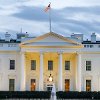
Presidential Communication Research
This article delves into the history of presidential communication, the impact that this form of political discourse continues to have on society, and current scholarship in the field.

Social Movement Communication Research
This guide explains the history and significance of Social Movement Communication, providing useful examples of the ways in which communication has been instrumental in movements that have led to political and social progress.

Communication
- Introduction
- Finding books
- Finding journal articles & titles
- Research & methodology
- SPEECH 40 - Inoculation Rhetoric
- Media literacy
- Political advertising
- Political satire
- SPEECH 37 - Health Communication
- Communication and science
- Communication and religion
- Media criticism
- Mass media industry
- Women & media
- Social media
- Internet resources
- Future of media
- Managing citations
- Scholarly communication This link opens in a new window
Subject Librarian

Finding Library resources
- In the Library's collections
- Introductory reading(s)
- Selected book titles
- Finding scholarly articles & journal titles
- Other library resource(s)
- Federal agencies & political advertising
The call number ranges for Communication in Politics are JF 2112 (Berry Level 4 ), HE 8700.75 through HE 8700.76 (Berry Level 3 ) and JA 84 through JA 85 (Berry Level 4 ). You will find most of these items in Baker/Berry Library on the indicated levels. There may be other relevant material in the Feldberg Business & Engineering Library. Always check the online catalog.
Useful subject headings with which to search the online catalog:
- communication in politics
- advertising, political
- press and politics
- mass media political aspects
- television in politics
- government and the press
- television advertising
- radio advertising
You can find political communication literature in many publications. You can use a specific, subject index such as Communication & Mass Media Commplete (CMMC) to find articles. Listed below are a couple of relevant journals. You can also use the search box at the top of the page.
Internet resource(s) for political communication
Keeping up with the journal literature.

You can get the app from the App Store or Google Play.
Don't own or use a mobile device? You can still use BrowZine! It's now available in a web version. You can get to it here . The web version works the same way as the app version. Find the journals you like, create a custom Bookshelf, get ToCs and read the articles you want.
- << Previous: Censorship
- Next: Political satire >>
- Last Updated: Apr 15, 2024 1:48 PM
- URL: https://researchguides.dartmouth.edu/communications
Social media and political communication: a social media analytics framework
- Original Article
- Published: 25 August 2012
- Volume 3 , pages 1277–1291, ( 2013 )
Cite this article

- Stefan Stieglitz 1 &
- Linh Dang-Xuan 1
34k Accesses
321 Citations
6 Altmetric
Explore all metrics
In recent years, social media are said to have an impact on the public discourse and communication in the society. In particular, social media are increasingly used in political context. More recently, microblogging services (e.g., Twitter) and social network sites (e.g., Facebook) are believed to have the potential for increasing political participation. While Twitter is an ideal platform for users to spread not only information in general but also political opinions publicly through their networks, political institutions (e.g., politicians, political parties, political foundations, etc.) have also begun to use Facebook pages or groups for the purpose of entering into direct dialogs with citizens and encouraging more political discussions. Previous studies have shown that from the perspective of political institutions, there is an emerging need to continuously collect, monitor, analyze, summarize, and visualize politically relevant information from social media. These activities, which are subsumed under “social media analytics,” are considered difficult tasks due to a large numbers of different social media platforms as well as the large amount and complexity of information and data. Systematic tracking and analysis approaches along with appropriate scientific methods and techniques in political domain are still lacking. In this paper, we propose a methodological framework for social media analytics in political context. More specifically, our framework summarizes most important politically relevant issues from the perspective of political institutions and corresponding methodologies from different scientific disciplines.
This is a preview of subscription content, log in via an institution to check access.
Access this article
Price includes VAT (Russian Federation)
Instant access to the full article PDF.
Rent this article via DeepDyve
Institutional subscriptions
Similar content being viewed by others
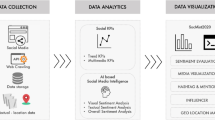
Social media analytics system for action inspection on social networks

Elections Again, Twitter May Help!!! A Large Scale Study for Predicting Election Results Using Twitter
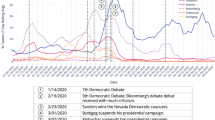
#Election2020: the first public Twitter dataset on the 2020 US Presidential election
Adamic L, Glance N (2005) The political blogosphere and the 2004 U.S. election: divided they blog. In: Proceedings of the 3rd international workshop on link discovery, pp 36–43
Adar E, Adamic L (2005) Tracking information epidemics in blogspace. In: Proceedings of the IEEE/WIC/ACM international conference on web intelligence, pp 207–214
Adar E, Adamic L, Zhang L, Lukose R (2004) Implicit structure and the dynamics of blogspace. Paper presented at the 13th international World Wide Web conference
Aday S, Farrel H, Lynch M, Sides J, Kelly J, Zuckerman E (2010) Blogs and bullets: New media in contentious politics. Technical report, U.S. Institute of Peace
Aggarwal CC, Han J, Wang J, Yu PS (2003) A framework for clustering evolving data streams. In: Proceedings of VLDB’03, pp 81–92
Agrawal D, Budak C, El Abbadi A (2011) Information diffusion in social networks: observing and influencing societal interests. In: Proceedings of VLDB’11
Ammann SL (2010) A political campaign message in 140 characters or less: the use of Twitter by U.S. Senate Candidates in 2010. http://ssrn.com/abstract=1725477
Auber D, Chiricota Y, Jourdan F, Melancon G (2003) Multiscale visualization of small-world networks. In: North SC, Munzner T (eds) Proceedings of IEEE information visualization symposium, Seattle, USA. IEEE Computer Press, San Francisco, pp 75–81
Google Scholar
Barabasi A (2002) Linked: the new science of networks. Perseus, Cambridge
Baumgartner JC, Morris JS (2010) Myfacetube politics: social networking web sites and political engagement of young adults. Soc Sci Comp Rev 28:24–44
Article Google Scholar
Benkler Y (2006) The wealth of networks: How social production transforms markets and freedom. Yale University Press, New Haven
Bennett L (2003) New media power: the Internet and global activism. In: Couldry N, Curran J (eds) Contesting media power: alternative media in a networked world. Rowman & Littlefield, Littlefield
Blei DM, Ng AY, Jordan MI, Lafferty J (2003) Latent dirichlet allocation. J Mach Learn Res 3:993–1022
Blei DM (2011) Introduction to probabilistic topic models. Comm ACM 55(4):77–84
Budak C, Agrawal D, El Abbadi A (2011) Structural trend analysis for online social networks. Technical Report UCSB/CS-2011-04, UCSB
Chadwick A (2006) Internet politics: states, citizens, and new communications technologies. Oxford University Press, New York
Chen D, Tang J, Li J, Zhou L (2009) Discovering the staring people from social networks. WWW’09: Proceedings of the 18th international conference on World Wide Web. ACM, New York, pp 1219–1220
Conover MD, Ratkiewicz J, Francisco M, Gonalves B, Flammini A, Menczer F (2011) Political polarization on Twitter. In: Proceedings of the 5th international conference on weblogs and social media
Creighton JL (2005) The public participation handbook: making better decisions through citizen involvement. Jossey-Bass, San Francisco
Doerfel M, Barnett G (1996) The use of Catpac for text analysis. Cult Anthropol Methods J 8(2):4–7
Facebook (2011) Facebook Official Statistics. http://www.facebook.com/press/info.php?statistics
Farrell H, Drezner D (2008) The power and politics of blogs. Public Choice 134(1):15–30
Freeman LC, White DR, Romney AK (eds) (1989) Research methods in social network analysis. Transaction books, New Brunswick
Gaffney D (2010) Iran election: quantifying online activism. In: Proceedings of WebSci’10: extending the frontiers of society on-line. USA, Raleigh, NC
Gilbert F, Simonetto P, Zaidi F, Jourdan F, Bourqui R (2011) Communities and hierarchical structures in dynamic social networks: analysis and visualization. Soc Netw Anal Min 1:83–95
Girvan M, Newman MEJ (2002) Community structure in social and biological networks. Proc Natl Acad Sci USA 99:8271–8276
Article MathSciNet Google Scholar
Golbeck J, Grimes JM, Rogers A (2010) Twitter use by the U.S. Congress. J Am Soc Inf Technol 61(8):1612–1621
Gruhl D, Nagarajan M, Pieper J, Robson C, Sheth A (2010) Multimodal social intelligence in a real-time dashboard system. Int J Very Large Data Bases 19(6):825–848
Hacker K, Coombs M, Weaver C, McCulloh G (2006) Possible uses of blogs and computer-mediated communication (CMC) for depolarizing political discourse. Paper presented to the Communication and Technology division (debate panel), Dresden, Germany
Herring SC, Scheidt LA, Bonus S, Wright E (2005) Weblogs as a bridging genre. Inform Technol People 18(2):142–171
Hillard D, Purpura S, Wilkerson J (2007) An active learning framework for classifiying political text. In: Annual Meeting of the Midwest Political Science Association, Chicago
Hofmann T (1999) Probabilistic latent semantic indexing. In: Proceedings of the 22nd annual international SIGIR conference on research and development in information retrieval
Hong S, Nadler D (2011) Does the Early Bird Move the Polls? The use of the social media tool ‘Twitter’ by U.S. politicians and its impact on public opinion. In: Proceedings of the International Conference on Digital Government Research
HuffPost Tech (2011) Twitter: we now have over 200 million accounts (update) http://www.huffingtonpost.com/2011/04/28/twitter-number-of-users_n_855177.html
Ingenhoff D, Röttger U (2008) Issues management. Ein zentrales Verfahren der Unternehmenskommunikation. In: Schmidt B (ed) Unternehmenskommunikation. Kommunikationsmanagement aus der Sicht der Unternehmensführung, pp 323–354
Kalnis P, Mamoulis N, Bakiras S (2005) On discovering moving clusters in spatio-temporal data. In: SSTD, pp 364–381
Kaplan AM, Haenlein M (2010) Users of the world, unite! The challenges and opportunities of Social Media. Bus Horiz 53(1):59–68
Karpf D (2009) Blogosphere research: a mixed-methods approach to rapidly changing systems. IEEE Intell Syst 24(5):67–70
Kasiviswanathan SP, Melville P, Banerjee A, Sindhwani V (2011) Emerging topic detection using dictionary learning. In: Proceedings of CIKM’11
Kavanaugh A, Fox EA, Sheetz S, Yang S, Li LT, Whalen T, Shoemaker D, Natsev P, Xie L (2011) Social media use by government: from the routine to the critical. In: Proceedings of the 12th Annual International Digital Government Research Conference: Digital Government Innovation in Challenging Times, College Park, Maryland, 12–15 June, 2011
Kaye BK (2005) It’s a blog, blog, blog world. Atl J Commun 13(2):73–95
Krippendorff K (2004) Content analysis. An introduction to its methodology, 2nd edn. The Sage Commtext Series. Sage Publications Ltd., London
Kushin M, Kitchener K (2009) Getting political on social network sites: Exploring online political discourse on Facebook. First Monday 14(11)
Larson K, Watson RT (2011) The value of social media: toward measuring social media strategies. In: Proceedings of ICIS 2011, Shanghai, China
Larsson A, Moe H (2011) Who tweets? Tracking microblogging use in the 2010 Swedish election campaign. In: ECIS 2011 Proceedings, Paper 251
Lassen DS, Brown AR (2011) Twitter: The electoral connection? Soc Sci Comp Rev 29(4):419–436
Leskovec J (2011) Social media analytics: tracking, modeling and predicting the flow of information through networks. In: Proceedings of WWW (Companion Volume) 2011, pp 277–278
Liu B (2010) Sentiment analysis: a multifaceted problem. IEEE Intell Syst 25:76–80
Liu B (2011) Web data mining: exploring hyperlinks, contents, and usage data. Springer, Heidelberg
Liu R, Guo W (2011) HMM-based state prediction for Internet hot topic. In: Proceedings of the IEEE International Conference on Computer Science and Automation Engineering (CSAE)
Mathioudakis M, Koudas N, Marbach P (2010) Early online identification of attention gathering items in social media. In: Proceedings of the third ACM international conference on Web search and data mining, New York, 4–6 February, 2010, USA
McAfee A (2006) Enterprise 2.0: the dawn of emergent collaboration. MIT Sloan Management Rev 47(3):20–28
McKenna L (2007) “Getting the word out:” policy bloggers use their soap box to make change. Rev Policy Res 24(3):209–229
McKenna L, Pole A (2007) What do bloggers do: an aver-age day on an average political blog. Public Choice 134(1):97–108
Monroe BL, Schrodt PA (2008) Introduction to the special issue: the statistical analysis of political text. Political Anal 16(4):351–355
Munson S, Resnick P (2011) The prevalence of political discourse in non-political blogs. In: Proceedings of 5th International Conference on Weblogs and Social Media (ICWSM 2011)
Nagarajan M, Sheth A, Velmurugan S (2011) Citizen sensor data mining, social media analytics and development centric web applications. In: Proceedings of the 20th international conference companion on world wide web (WWW’11), pp 289–290
Newman ME, Girvan M (2004) Finding and evaluating community structure in networks. Phys Rev E Stat Nonlin Soft Matter Phys 69(2 Pt 2):026113
Pang B, Lee L (2008) Opinion mining and sentiment analysis. Found Trends Inf Retr 2(1–2):1–135
Paris C, Wan S (2011) Listening to the community: social media monitoring tasks for improving government services. Proc Ext Abstr CHI ACM 2011:2095–2100
Prabhu J, Sudharshan M, Saravanan M, Prasad G (2010) Augmenting rapid clustering method for social network analysis. Int Conf Adv Soc Netw Analysis Min 2010:407–408
Robertson SP, Vatrapu RK, Medina R (2010) Off the wall political discourse: Facebook use in the 2008 U.S. Presidential election. Information Polity 15:11–31
Romero DM, Galuba W, Asur S, Huberman BA (2011) Influence and passivity in social media. In: Proceedings of the 20th international conference companion on World wide web, pp 113–114
Rosen D, Barnett G, Kim JH (2011) Social networks and online environments: when science and practice co-evolve. Soc Netw Analysis Min 1(1):27–42
Scharkow M (2011) Thematic content analysis using supervised machine learning. An empirical evaluation using German online news. Quality Quantity (online first)
Schmidt J (2007) Blogging practices: an analytical framework. J Comput Mediat Commun 12(4):1409–1427
Scott J, Carrington PC (eds) (2011) Handbook of social network analysis. Sage, London
Sebastiani F (2002) Machine learning in automated text categorization. ACM Comput Surv 34(1):1–47
Stieglitz S, Kaufhold C (2011) Automatic full text analysis in public social media - adoption of a software prototype to investigate political communication. Procedia Comput Sci 5:776–781
Stieglitz S, Dang-Xuan L, Brockmann T (2012) Usage of social media for political communication in Germany. In: Proceedings of PACIS 2012, forthcoming
Stone P, Dunphy D, Smith M, Ogilvie D (1966) The general inquirer: a computer approach to content analysis. The MIT Press, Cambridge
Sunstein C (2002) The law of group polarization. J Political Philos 10(2):175–195
Takacs G, Pilaszy I, Nemeth G, Tikk D (2007) On the gravity recommendation system. In: Proceeding of KDD cup and workshop
Tumasjan A, Sprenger T, Sandner P, Welpe L (2011) Election forecasts with Twitter: how 140 characters reflect the political landscape. Soc Sci Comput Rev 29(4):402–418
Utz S (2009) The (potential) benefits of campaigning via social network sites. J Comput Mediat Commun 14:221–243
van Atteveldt W (2008) Semantic network analysis: techniques for extracting, representing, and querying media content. BookSurge Publishers, Charleston
Vitak J, Zube P, Sfmock A, Caleb T, Ellison N, Lampe C (2011) It’s complicated: Facebook users’ political participation in the 2008 election. Cyberpsychol Behav Soc Netw 14(3):107–114
Wartick S, Mahon J (1994) Toward a substantive definition oft he corporate issue construct—a review and synthesis of the literature. Business Soc 33:293–311
Wasserman S, Faust K (1994) Social network analysis: methods and applications. Cambridge University Press, New York
Book Google Scholar
Wattal S, Schuff D, Mandviwalla M, Williams C (2010) Web 2.0 and politics: the 2008 U.S. presidential election and an e-politics research agenda. MIS Q 34(4):669–688
Wigand RT, Wood JD, Mande DM (2010) Taming the social network jungle: from web 2.0 to social media. In: Proceedings of the Americas Conference on Information Systems, Paper 416
Williams C, Gulati G (2007) Social networks in political campaigns: Facebook and the 2006 midterm elections. Annual Meeting of the American Political Science Association
Williams C, Gulati G (2009) Facebook grows up: an empirical assessment of its role in the 2008 congressional elections. Annual Meeting of the Midwest Political Science Association
Wu F, Huberman B (2004) Social structure and opinion formation. HP Labs Research Paper, Palo Alto
Yardi S, Boyd D (2010) Dynamic debates: an analysis of group polarization over time on twitter. Bull Sci Technol Soc 20:1–8
Zeng J, Zhang S, Wu C, Xie J (2007) Predictive model for internet public opinion. In: Proceedings of the Fourth International Conference on Fuzzy Systems and Knowledge Discovery (FSKD 2007)
Zeng D, Chen H, Lusch R, Li S (2010) Social media analytics and intelligence. IEEE Intell Syst 25(6):13–16
Zhang W, Johnson TJ, Seltzer T, Bichard S (2010) The revolution will be networked: the influence of social networking sites on political attitudes and behavior. Soc Sci Comput Rev 28:75–92
Download references
Author information
Authors and affiliations.
Department of Information Systems, University of Muenster, Muenster, Germany
Stefan Stieglitz & Linh Dang-Xuan
You can also search for this author in PubMed Google Scholar
Corresponding author
Correspondence to Stefan Stieglitz .
Rights and permissions
Reprints and permissions
About this article
Stieglitz, S., Dang-Xuan, L. Social media and political communication: a social media analytics framework. Soc. Netw. Anal. Min. 3 , 1277–1291 (2013). https://doi.org/10.1007/s13278-012-0079-3
Download citation
Received : 02 February 2012
Revised : 24 May 2012
Accepted : 13 July 2012
Published : 25 August 2012
Issue Date : December 2013
DOI : https://doi.org/10.1007/s13278-012-0079-3
Share this article
Anyone you share the following link with will be able to read this content:
Sorry, a shareable link is not currently available for this article.
Provided by the Springer Nature SharedIt content-sharing initiative
- Social media
- Social media analytics
- Political communication
- Find a journal
- Publish with us
- Track your research
- Frontiers in Communication
- Media Governance and the Public Sphere
- Research Topics
Strategic Narratives in Political and Crisis Communication: Responses to COVID-19
Total Downloads
Total Views and Downloads
About this Research Topic
The 2019 coronavirus disease (2019-nCoV, more widely known as COVID-19), caused by the severe acute respiratory syndrome coronavirus 2 (SARS-CoV-2), is a global health emergency of unprecedented proportions. The ongoing loss of life globally, articulated differently within individual nations and institutions, ...
Keywords : Novel SARS-Coronavirus-2/SARS-CoV-2/COVID-19, Digital Media, Mis/Disinformation, Political and Governance Institutions, Public Health Communication
Important Note : All contributions to this Research Topic must be within the scope of the section and journal to which they are submitted, as defined in their mission statements. Frontiers reserves the right to guide an out-of-scope manuscript to a more suitable section or journal at any stage of peer review.
Topic Editors
Topic coordinators, recent articles, submission deadlines.
Submission closed.
Participating Journals
Total views.
- Demographics
No records found
total views article views downloads topic views
Top countries
Top referring sites, about frontiers research topics.
With their unique mixes of varied contributions from Original Research to Review Articles, Research Topics unify the most influential researchers, the latest key findings and historical advances in a hot research area! Find out more on how to host your own Frontiers Research Topic or contribute to one as an author.
Research Topic: Political Communication
Physiological response to political advertisement: examining the influence of partisan and….
This study investigates voters’ physiological response to real political advertisements that are issue focused and sponsored by three different political…
News About China in Changing Media Systems: A Comparative Study of…
Publication: Mass Communication Research Co-authors: Francis Lee, Chinese University of Hong Kong; Ping Shaw, National Sun Yat-sen University
Populist Candidate in Polarizing Media and Election
Full title: The “populist imbecile” versus the “heartless shrew”: Polarizing election coverage and voters’ evaluation in Taiwan Abstract: This study…
Academia.edu no longer supports Internet Explorer.
To browse Academia.edu and the wider internet faster and more securely, please take a few seconds to upgrade your browser .
Enter the email address you signed up with and we'll email you a reset link.
- We're Hiring!
- Help Center

Government Communication: An Emerging Field in Political Communication Research
The SAGE Handbook of Political Communication
Related Papers
Comunicación y sociedad
Karen Sanders
RefDoc Bienvenue - Welcome. Refdoc est un service / is powered by. ...
Nasiru Suleman
Sage Handbook of Political Communication
Kevin G Barnhurst
Public Relations Journal, 7(4), 2013
Chiara Valentini
This article examines the state of political public relations in the European Union by specifically focusing on reputation management and relationship management. Its arguments are based on a theoretical review of the literature of political public relations, reputation and relationship management, and EU communication. The article suggests an in-depth examination of the nature of some of the EU’s major problems in political public relations, and contributes to a more nuanced understanding of the possibilities and limitations of applying reputation and relationship management constructs to a political context. The nature of the analysis is exploratory rather than definitive, and specific investigations are needed to thoroughly explore and better theorize political reputation and relationship management in various political contexts.
International Journal of Press-politics
Maria-Jose Canel
International Public Relations
Margalit Toledano , Ian Somerville
This book opens up ways of seeing how public relations and communication operates in complex, fraught environments where the idea of setting clear objectives, targeting audiences, delivering slick messages, are continually undermined by the fluid contexts of conflict and division. It will be an important addition to the growing body of work on public relations beyond the organisational context. Lee Edwards, Associate Professor, Communication Studies and PR, University of Leeds, UK
silvio waisbord
The Journal of Public Interest Communications
Pamala Proverbs
Care is not a word generally associated with political crises. However, following the mosques massacre in New Zealand, Prime Minister Jacinda Ardern was found to have used care and a feminist approach to political communication that served to unite rather than divide her country following this racially motivated terrorist attack. There is much literature on corporate crises, but this paper adds to the dearth of literature on political crises in a public interest context. Grounded in a consideration of care and agenda building theories, it reveals that a caring approach to political communication (both verbal and nonverbal) following an act of terrorism can influence the media agenda and by extension public opinion.
Jesper Stromback
Philippa Brear
This paper will look at a public relations campaign, led by the Orissa State Government in India, to create awareness of India’s Right to Information (RTI) legislation, and consider whether it meets conditions set out by Mendelsohn (1973) for the success of public information campaigns, and more recently corroborated by Windahl et al (p.145): • campaigns should have realistic goals • strategists should use environmental systems to support complement mass communication, for example interpersonal communication • strategists should know and segment their target publics
RELATED PAPERS
Holli A Semetko
Partecipazione e Conflitto
Alessandro Lovari
SAGE Handbook of Political Communication
Deen Freelon
Marco Clemente
Alessandro Lovari , Lucia D'Ambrosi , Shannon A Bowen
mariola tarrega
Centro de estudos de comunicação e sociedade
Bianca Persici Toniolo
JKAP (Jurnal Kebijakan dan Administrasi Publik)
Khoirun Nisa'
Catrin Johansson
Ian Somerville , Gisela Gonçalves , Ana D U A R T E Melo
Journal of Public Affairs
Elisabeth Fondren
Routledge eBooks
Evandro Oliveira
Peter Simmons
The Handbook of Crisis Communication
Jesper Falkheimer
Frank Esser
Yolanda HUI
International Journal of Media, Journalism and Mass Communications
Robert Aswani
Odinma Chima
Eno Akpabio
The Handbook of Strategic Communication, First Edition
Sergei A . Samoilenko
Sigurd Allern
Harvard International Journal of Press-politics
Carsten Reinemann
THE PROCEEDINGS OF THE INTERNATIONAL HISTORY OF PUBLIC RELATIONS CONFERENCE 2011
Alina Dolea
Nete N Kristensen
Barbra Natifu
Guy Golan , Kinsey Dennis
Barbra Natifu , Robert Crawford
Holladay, Sherry J
International Journal of Communication
Cornelius Pratt
Chehou OUSSOUMANOU
… OF THE INTERNATIONAL HISTORY OF PUBLIC …
Inga Latkovska
European Journal of Communication
Nordicom Review
Shirley Leitch
Stylianos Papathanassopoulos
RELATED TOPICS
- We're Hiring!
- Help Center
- Find new research papers in:
- Health Sciences
- Earth Sciences
- Cognitive Science
- Mathematics
- Computer Science
- Academia ©2024
Research Topics & Ideas: Politics
100+ Politics-Related Research Ideas To Fast-Track Your Project

Finding and choosing a strong research topic is the critical first step when it comes to crafting a high-quality dissertation or thesis. If you’ve landed on this post, chances are you’re looking for a politics-related research topic , but aren’t sure where to start. Here, we’ll explore a variety of politically-related research ideas across a range of disciplines, including political theory and philosophy, comparative politics, international relations, public administration and policy.
NB – This is just the start…
The topic ideation and evaluation process has multiple steps . In this post, we’ll kickstart the process by sharing some research topic ideas. This is the starting point, but to develop a well-defined research topic, you’ll need to identify a clear and convincing research gap , along with a well-justified plan of action to fill that gap.
If you’re new to the oftentimes perplexing world of research, or if this is your first time undertaking a formal academic research project, be sure to check out our free dissertation mini-course. Also, be sure to sign up for our free webinar that explores how to find a high-quality research topic from scratch.
Overview: Politics-Related Topics
- Political theory and philosophy
- Comparative politics
- International relations
- Public administration
- Public policy
- Examples of politics-related dissertations
Topics & Ideas: Political Theory
- An analysis of the impact of feminism on political theory and the concept of citizenship in Saudi Arabia in the context of Vision 2030
- A comparative study of the political philosophies of Marxism and liberalism and their influence on modern politics
- An examination of how the Covid-19 pandemic affected the relationship between individual freedom and collective responsibility in political philosophy
- A study of the impact of race and ethnicity on French political philosophy and the concept of justice
- An exploration of the role of religion in political theory and its impact on secular democracy in the Middle East
- A Review of Social contract theory, comparative analysis of the political philosophies of Hobbes, Locke, and Rousseau
- A study of the concept of the common good in political philosophy and its relevance to the ongoing refugee crisis in Europe
- An examination of the relationship between political power and the rule of law in developing African countries
- A study of the impact of postmodernism on political theory and the concept of truth, a case study of the US
- An exploration of the role of virtue in political philosophy and its impact on the assessment of moral character in political leaders

Topics & Ideas: Comparative Politics
- A comparative study of different models of federalism and their impact on democratic governance: A case Study of South American federalist states
- The impact of ethnic and religious diversity on political stability and democracy in developing countries, a review of literature from Africa
- An analysis of the role of civil society in promoting democratic change in autocratic regimes: A case study in Sweden
- A comparative examination of the impact of globalization on political institutions and processes in South America and Africa.
- A study of the factors that contribute to successful democratization in authoritarian regimes, a review of the role of Elite-driven democratization
- A comparison of the political and economic systems of China and India and their impact on social development
- The impact of corruption on political institutions and democracy in South East Asia, a critical review
- A comparative examination of the impact of majoritarian representation (winner-take-all) vs proportional representation on political representation and governance
- An exploration of Multi-party systems in democratic countries and their impact on minority representation and policy-making.
- A study of the factors that contribute to successful decentralization and regional autonomy, a case study of Spain

Topics & Ideas: International Relations
- A comparative analysis of the effectiveness of diplomacy and military force in resolving international conflicts in Central Africa.
- The impact of globalization on the sovereignty of nation-states and the changing nature of international politics, a review of the role of Multinational Corporations
- An examination of the role of international aid organizations in promoting peace, security, and development in the Middle East.
- A study of the impact of economic interdependence on the likelihood of conflict in international relations: A critical review of weaponized interdependence
- A comparative analysis of the foreign policies of the EU and the US and their impact on international stability in Africa
- An exploration of the relationship between international human rights and national sovereignty during the Covid 19 pandemic
- A study of the role of decentralized autonomous organizations (DAO)s in international politics and their impact on state behaviour
- A comparative analysis of the effectiveness of international regimes in addressing global challenges such as climate change, arms control, and terrorism in Brazil
- An examination of the impact of the rise of BRICS on the international system and global governance
- A study of the role of ideology in shaping the foreign policies of states and the dynamics of international relations in the US

Tops & Ideas: Public Administration
- An analysis of the impact of digital technology on public administration and the delivery of public services in Estonia
- A review of models of public-private partnerships and their impact on the delivery of public services in Ghana
- An examination of the role of civil society organizations in monitoring and accountability of public administration in Papua New Guinea
- A study of the impact of environmentalism as a political ideology on public administration and policy implementation in Germany
- An exploration of the relationship between public administration and citizen engagement in the policy-making process, an exploration of gender identity concerns in schools
- A comparative analysis of the efficiency and effectiveness of public administration, decentralisation and pay and employment reform in developing countries
- A study of the role of collaborative leadership in public administration and its impact on organizational performance
- A systematic review of the challenges and opportunities related to diversity and inclusion in police services
- A study of the impact of corrupt public administration on economic development and regional growth in Eastern Europe
- An exploration of the relationship between public administration and civil rights and liberties, including issues related to privacy and surveillance, a case study in South Korea

Topics & Ideas: Public Policy
- An analysis of the impacts of public policy on income inequality and poverty reduction in South Sudan
- A comparative study of the effectiveness of legal and regulatory, economic and financial, and social and cultural instruments for addressing climate change in South Korea
- An examination of the role of interest groups in shaping public policy and the policy-making process regarding land-use claims
- A study of the impact of globalization on the development of public policies and programs for mitigating climate change in Singapore
- An exploration of the relationship between public policy and social justice in tertiary education in the UAE
- A comparative analysis of the impact of health policies for the management of diabetes on access to healthcare and health outcomes in developing countries
- Exploring the role of evidence-based policymaking in the design and implementation of public policies for the management of invasive invertebrates in Australia
- An examination of the challenges and opportunities of implementing educational dietary public policies in developing multicultural countries
- A study of the impact of public policies on urbanization and urban development in rural Indonesia
- An exploration of the role of media and public opinion in shaping public policy and the policy-making process in the transport industry of Malaysia
Examples: Politics Dissertations & Theses
While the ideas we’ve presented above are a decent starting point for finding a politics-related research topic, they are fairly generic and non-specific. So, it helps to look at actual dissertations and theses to see how this all comes together.
Below, we’ve included a selection of research projects from various politics-related degree programs to help refine your thinking. These are actual dissertations and theses, written as part of Master’s and PhD-level programs, so they can provide some useful insight as to what a research topic looks like in practice.
- We, the Righteous Few: Immoral Actions of Fellow Partisans are Judged as Less Possible (Varnam, 2020)
- Civilizing the State: Civil Society and the Politics of Primary Public Health Care Provision in Urban Brazil (Gibson, 2012)
- Political regimes and minority language policies: evidence from Taiwan and southeast Asia (Wu, 2021)
- The Feminist Third Wave: Social Reproduction, Feminism as Class Struggle, and Contemporary Women’s Movements (Angulo, 2019)
- The Politics of Immigration under Authoritarianism (Joo, 2019)
- The politics of digital platforms: Sour Dictionary, activist subjectivities, and contemporary cultures of resistance (Okten, 2019)
- Vote choice and support for diverse candidates on the Boston City Council At-Large (Dolcimascolo, 2022)
- The city agenda: local governance and national influence in the policy agenda, 1900-2020 (Shannon, 2022)
- Turf wars: who supported measures to criminalize homelessness in Austin, Texas? (Bompiedi, 2021)
- Do BITs Cause Opposition Between Investor Rights and Environmental Protection? (Xiong, 2022)
- Revealed corruption and electoral accountability in Brazil: How politicians anticipate voting behavior (Diaz, 2021)
- Intersectional Solidarity: The Political Consequences of a Consciousness of Race, Gender and Sexuality (Crowder, 2020)
- The Congressional Hispanic Caucus and the Coalitional Representation of Latinxs in the U.S. House of Representatives (Munoz, 2019)
Looking at these titles, you can probably pick up that the research topics here are quite specific and narrowly-focused , compared to the generic ones presented earlier. In other words, to create a top-notch research topic, you must be precise and target a specific context with specific variables of interest . In other words, you need to identify a clear, well-justified research gap.
Get 1:1 Help
If you’re still feeling a bit unsure about how to find a research topic for your dissertation or research project, check out our Topic Kickstarter service below.
You Might Also Like:

Interesting thesis.
I really appreciate your work which will greatly help me rethink on my topic
Please how can I get the full thesis?
Submit a Comment Cancel reply
Your email address will not be published. Required fields are marked *
Save my name, email, and website in this browser for the next time I comment.
- Print Friendly
Interpersonal Discussion and Political Knowledge: Unpacking the Black Box via a Combined Experimental and Content-Analytic Approach
Over 130 studies have examined the relationship between interpersonal political discussion and political knowledge, generally finding that discussion can increase people’s level of political knowledge (Amsalem & Nir, 2019). However, two important questions remain unanswered: (a) Do some types of political discussions facilitate greater levels of political knowledge than others? (b) Do people retain knowledge gained from political discussions? In this study (N = 96), we addressed these questions using a novel methodological approach that combines a lab experiment, in which we manipulated the occurrence of political discussion, with a systematic content analysis of participants’ discussions (N = 1,080 distinct instances of discussions). We found that discussions involving confirmatory feedback and cueing were associated with greater levels of political knowledge than other types of discussions. Furthermore, knowledge gains from discussion were not retained after a short delay. Our study lays the theoretical and methodological groundwork for future investigations into the “black box” of political discussion.
Related Topics
- Human Communication Research
More Publications
Social identification and interpersonal communication in computer-mediated communication: what you do versus who you are in virtual groups, optimistic biases among facebook users: self-other discrepant perceptions toward potential risks and benefits of facebook use, putting your best face forward: the accuracy of online dating photographs.
Facebook went away. Political divides didn't budge.
In the weeks before and after the 2020 presidential election, researchers at Stanford and elsewhere ran a number of tests to try to understand how much Facebook and its corporate cousin, Instagram, may be contributing to the nation's political divide.
One of those experiments — led by Matthew Gentzkow and Hunt Allcott , senior fellows at the Stanford Institute for Economic Policy Research (SIEPR) — centered on more than 35,000 Facebook and Instagram users who were paid to stay off the platforms in the run-up to Election Day. There’s a lot that researchers could glean from the social media hiatus, including whether people’s political attitudes shifted and in what ways. If views changed dramatically, that would support the argument that Facebook and Instagram, and social media generally, are helping to drive Americans apart.
The results of that deactivation exercise — the largest ever involving social media users and the first to include Instagram — are in: Staying off Facebook and Instagram in the final stretch of the November vote had little or no effect on people’s political views, their negative opinions of opposing parties, or beliefs around claims of election fraud.
But when it comes to Facebook’s impact on what people believed about current events, the researchers reached two conclusions. Those who were off Facebook were worse at answering news quiz questions, but they were also less likely to fall for widely circulated misinformation, suggesting that the platform can be an important conduit for both real and false news.
These findings, newly published by the Proceedings of the National Academy of Sciences, are in line with the main takeaways of the other experiments into Facebook and Instagram’s potential influence around the 2020 election, in which changing news feeds and limiting re-sharing of posts didn’t reduce polarization or change beliefs about whether the voting process was tainted. Those tests were detailed in four papers published in July 2023 in Science and Nature .
Taken together, the papers suggest that, when it comes to U.S. politics, Facebook and Instagram may not have as much ability to shape political attitudes during an election season as the popular narrative suggests.
And like the previous studies, the Gentzkow and Allcott-led study doesn’t absolve Meta Platforms, which owns Facebook and Instagram, from the messy state of U.S. politics. For one thing, the results support the view that Facebook may create harm by distributing misinformation. Gentzkow says it’s also possible that the platforms contributed to polarization in the past, even if people’s use of them in the run-up to the election had limited impact.

“We are not ruling out the possibility that Facebook and Instagram contribute to polarization in other ways over time,” says Gentzkow, who is the Landau Professor of Technology and the Economy in the Stanford School of Humanities and Sciences.
He also notes another finding suggesting that using Facebook in the weeks before the 2020 presidential election may have made people somewhat more likely to vote for Donald Trump and somewhat less likely to vote for Joe Biden. This could suggest that, for Facebook users who still were on the site, Trump’s campaign was savvier at building support than Biden’s team was.
“This effect was not quite statistically significant, so we need to take it with a grain of salt,” Gentzkow says. “But if it’s real, it’s big enough that it could impact the outcome of a close election.”
Meta opens up a trove of data
The study led by Gentzkow and Allcott — and the four that preceded it — are part of a massive research project that has been billed as the most comprehensive, evidence-based investigation yet into the role of social media in American democracy.
The project came together following critiques of Meta’s role in the spread of fake news, Russian influence, and the Cambridge Analytica data breach. The collaboration between academics and Meta researchers involved a series of steps to protect the integrity of the research , which builds on work by Stanford Law School Professor Nathaniel Persily on how to structure partnerships between academia and social media companies. Meta, for example, agreed not to prohibit any findings from being published.
In all, nearly 20 independent social scientists — including Gentzkow; Allcott, a professor at the Stanford Doerr School of Sustainability; Neil Malhotra, a political economist at the Stanford Graduate School of Business; and, Shanto Iyengar and Jennifer Pan, both political scientists in the Stanford School of Humanities and Sciences — are part of the project.
“Access to Meta’s proprietary data has allowed us to jump over big barriers to research on extremely important issues involving social media and politics,” Gentzkow says.
Gentzkow and Allcott’s study — whose 31 co-authors include five current and former SIEPR predocs and one former SIEPR undergraduate research fellow — involved roughly 19,900 Facebook users and 15,600 Instagram users who agreed to stop using the platforms ahead of the 2020 election. About a quarter of them agreed to deactivate their accounts for six weeks before the November vote. The rest comprised a control group that logged off for just one week.
The study’s analysis relies on a number of measures, among them participant surveys, state voting records, campaign donations, and Meta platform data. Some participants also allowed the researchers to track how they used other news and social media services when they were off Facebook or Instagram.
On top of the findings on polarization, knowledge, and Republican support, the authors conclude that Facebook and Instagram help people engage in the political process — mostly through posting about politics and signing petitions online (voter turnout didn’t change).
Takeaways for 2024 and beyond
Gentzkow says that the study’s finding that Facebook and Instagram didn’t change people’s political attitudes or beliefs in claims of electoral fraud in 2020 is especially interesting in light of his previous research with Allcott. In an earlier smaller-scale study of Facebook users who stayed off the platform for a month ahead of the 2018 midterms, the authors did find evidence that it contributes to polarization.
The distinction, Gentzkow says, could be that people are aware enough of political issues during a presidential election, so Facebook and Instagram have little or no effect on their beliefs or attitudes. But during other elections, when information about candidates or issues are not so front and center, social media may have more influence over what people think.
“Even though Facebook and Instagram did not contribute to polarization in the runup to the 2020 election, it’s possible that they are helping to widen political divides in other contexts where people’s views are less entrenched,” Gentzkow says.
And though the study was limited to the six weeks leading up to the presidential vote, it’s still a critical time in U.S. politics — hence the phenomenon known as the “ October surprise .”
“Things happen in the home stretch of a presidential election that can change poll numbers,” he says. “We’ve learned from this study that altering how much time people spend on Facebook and Instagram during that period isn’t likely to make a huge difference.”
More News Topics
When the export-import bank closed up, us companies saw global sales plummet.
- Global Development and Trade
- Money and Finance
- Research Highlight
Adrien Auclert appointed as an economic advisor to French government
- Awards & Appointments
- Taxes and Public Spending
IMF's Gita Gopinath: Geopolitics and its impact on global trade and the dollar
share this!
May 13, 2024
This article has been reviewed according to Science X's editorial process and policies . Editors have highlighted the following attributes while ensuring the content's credibility:
fact-checked
peer-reviewed publication
trusted source
Psychological research offers strategies for healthy political discussions among people with opposing views
by American Psychological Association

Civilized political debates may seem increasingly out of reach as democracies across the world face rising polarization, but people still want to discuss issues with people they disagree with—especially those who present themselves as balanced and willing to seek solutions that work for everyone or open to learning new information, according to two studies published by the American Psychological Association.
One study, published in the Journal of Experimental Psychology: General , examines how U.S. politicians and ordinary Americans with opposing political beliefs could share their ideas on divisive issues in a way that improved respect regardless of political party.
While reviewing a video series featuring real-world politicians solving political dilemmas designed to help voters evaluate the thoughtfulness of political candidates, researchers realized that the videos made viewers from the opposing party more open to learning about the politicians' platform. They found this was because the videos made the politicians look balanced and pragmatic, two key characteristics of wise decision-makers.
"It's easy for us to think about members of both parties as being completely biased in favor of their side. But what happens so much of the time is that people talk past each other or show more interest in pointing out the ridiculous things the other side is doing rather than actually finding solutions," said co-author Curtis Puryear, Ph.D., a post-doctoral researcher in the Kellogg School of Management at Northwestern University.
"Our findings suggest that if you show you care about understanding the other side's concerns, it goes a long way towards fostering respect."
Puryear and co-author Kurt Gray, Ph.D., of the University of North Carolina at Chapel Hill, conducted eight experiments with more than 3,500 participants to test the effectiveness of political messages that relied on balanced pragmatism, an approach to conflict that focuses on showing concern for both sides' interests while prioritizing practical solutions.
In one experiment, 505 Americans from different political parties evaluated a series of posts on the social media platform X by members of the U.S. House of Representatives. From a sample of more than 50,000 posts made by the representatives' official accounts, the researchers selected 120 posts that discussed political issues without criticizing the opposing party and varied in how balanced and pragmatic each post was.
Each participant evaluated 30 posts, rating them based on how balanced and pragmatic each post seemed, the post's overall tone, how divisive the post seemed, how much they respected the politician and how interested they would be in hearing more about the politician's point of view.
The researchers found that posts that combined balance with pragmatism were the most likely to increase participants' respect for a politician and their willingness to engage with them. Posts in which a politician mainly expressed a desire to find effective solutions improved participants' respect regardless of party, but this was not as effective at garnering respect compared with politicians who also presented a balanced view of an issue.
The benefits of balanced pragmatism for fostering respect were even more pronounced for posts discussing highly divisive issues, like immigration and abortion.
"Logical analyses and strong arguments can make us see someone as competent, which is a trait we value in leaders and friends," said Puryear. "But people also want leaders who understand their constituents, who care about their concerns, and have the practical knowledge to find solutions. These are the qualities of balanced and pragmatic leaders."
In another experiment, researchers focused on whether ordinary Americans could also use balanced pragmatism to improve their political conversations. They recruited 211 Democrats in favor of decreasing deportations of undocumented immigrants and 85 Republicans in favor of increasing deportations. The participants were shown four comments written by participants in a previous experiment who argued their position on deportation using either balanced pragmatism or logical reasoning.
Overall, people were just as likely to say they wanted to have a conversation with someone who disagreed with their views on immigration when that person appeared balanced and pragmatic as they were to say they wanted to talk with someone from their own political party.
While it can be difficult for people to present their views on a divisive issue in a way that respects an opposing viewpoint and looks for a common solution, it could help solve the rising political animosity that we are facing, Puryear said.
"Being balanced and pragmatic takes effort," he said. "But it is like building any other habit: Changing how we approach politics takes commitment and practice. We can each take it upon ourselves to do that."
Another study, published in the Journal of Personality and Social Psychology , found that people could be willing to discuss controversial topics, such as gender-neutral language, with people who had opposing views when both express intellectual humility.
Intellectual humility is the recognition that your knowledge has limits and your beliefs could be wrong. It does not mean that someone who is intellectually humble is insecure or that they don't have informed opinions, only that they are willing to acknowledge that they do not know everything.
"Intellectual humility could be an important aspect when trying to understand how to help people engage in these discussions on divisive issues," said the study's lead author, Larissa Knöchelmann, MSc, a research fellow and advanced Ph.D. student at Philipps-Universität Marburg. "Political discussions are important for a democratic society. When people have conversations, they can learn about new perspectives, reduce misunderstandings and work together."
The researchers conducted four experiments with more than 1,600 participants. In one experiment, they asked 451 Germans about their beliefs regarding the COVID-19 vaccine and whether it should be mandatory, a highly polarized debate in Germany when the experiment was conducted.
They were then asked to imagine an online meeting with a new neighbor whose views on vaccination were either the same as or contrary to theirs. They also saw a statement from their neighbor that indicated whether controversial discussions were "boring" because the neighbor felt they knew enough about the topic already or "exciting" because it was an opportunity to learn more.
The researchers found that intellectually humble participants had warmer feelings and more positive evaluations toward groups of people with different political opinions.
Additionally, intellectual humility shaped whether participants were willing to interact with others or not. While non-humble participants would rather talk with someone who shared their opinion, intellectually humble participants did not discriminate between those having the same or a contrary opinion.
Overall, intellectually humble conversation partners were approached more and avoided less because participants perceived them as more likable and the respective conversation as more calm, comfortable and open.
"Many German citizens have the impression that open political debates and an exchange of opinions are not possible anymore. This is especially the case when it comes to emotionally charged political topics," said Knöchelmann. "Our research now shows that intellectual humility can help to make people more willing to engage with others."
Curtis Puryear et al, Using "Balanced Pragmatism" in Political Discussions Increases Cross-Partisan Respect, PsyArXiv (2021). DOI: 10.31234/osf.io/yhpdt
Journal information: Journal of Personality and Social Psychology , Journal of Experimental Psychology: General
Provided by American Psychological Association
Explore further
Feedback to editors

Physicists propose path to faster, more flexible robots
4 hours ago

Scientists develop new geochemical 'fingerprint' to trace contaminants in fertilizer
16 hours ago

Study reveals how a sugar-sensing protein acts as a 'machine' to switch plant growth—and oil production—on and off

Researchers develop world's smallest quantum light detector on a silicon chip

How heat waves are affecting Arctic phytoplankton

Horse remains show Pagan-Christian trade networks supplied horses from overseas for the last horse sacrifices in Europe

Ion irradiation offers promise for 2D material probing
17 hours ago

Furry thieves are running loose in a Maine forest, research shows

Study indicates Earth's earliest sea creatures drove evolution by stirring the water
18 hours ago

Chemists develop new method for introducing fluorinated components into molecules
Relevant physicsforums posts, cover songs versus the original track, which ones are better.
7 hours ago
What are your favorite Disco "Classics"?
May 17, 2024
Who is your favorite Jazz musician and what is your favorite song?
For ww2 buffs, blues and broken hearts.
May 16, 2024
Which ancient civilizations are you most interested in?
May 15, 2024
More from Art, Music, History, and Linguistics
Related Stories

Research suggests darker side of being politically confident
Apr 15, 2024

Talking politics with strangers isn't as awful as you'd expect, research suggests
Apr 3, 2024

Republicans and Democrats consider each other immoral. Even when treated fairly and kindly by the opposition
Feb 1, 2024

Want to avoid heated arguments? Try this technique before having a difficult conversation
Feb 9, 2023

When processing misinformation, British voters are divided more along party lines than over Brexit: Study
Feb 2, 2023

How to depolarize political toxicity on social media
Aug 22, 2023
Recommended for you

The power of ambiguity: Using computer models to understand the debate about climate change

Study finds avoiding social media before an election has little to no effect on people's political views

Study shows AI conversational agents can help reduce interethnic prejudice during online interactions
May 10, 2024

Study finds liberals and conservatives differ on climate change beliefs—but are relatively united in taking action
May 9, 2024

Analysis of millions of posts shows that users seek out echo chambers on social media

The spread of misinformation varies by topic and by country in Europe, study finds
May 8, 2024
Let us know if there is a problem with our content
Use this form if you have come across a typo, inaccuracy or would like to send an edit request for the content on this page. For general inquiries, please use our contact form . For general feedback, use the public comments section below (please adhere to guidelines ).
Please select the most appropriate category to facilitate processing of your request
Thank you for taking time to provide your feedback to the editors.
Your feedback is important to us. However, we do not guarantee individual replies due to the high volume of messages.
E-mail the story
Your email address is used only to let the recipient know who sent the email. Neither your address nor the recipient's address will be used for any other purpose. The information you enter will appear in your e-mail message and is not retained by Phys.org in any form.
Newsletter sign up
Get weekly and/or daily updates delivered to your inbox. You can unsubscribe at any time and we'll never share your details to third parties.
More information Privacy policy
Donate and enjoy an ad-free experience
We keep our content available to everyone. Consider supporting Science X's mission by getting a premium account.
E-mail newsletter
Numbers, Facts and Trends Shaping Your World
Read our research on:
Full Topic List
Regions & Countries
- Publications
- Our Methods
- Short Reads
- Tools & Resources
Read Our Research On:
Broad Public Support for Legal Abortion Persists 2 Years After Dobbs
By more than 2 to 1, americans say medication abortion should be legal, table of contents.
- Other abortion attitudes
- Overall attitudes about abortion
- Americans’ views on medication abortion in their states
- How statements about abortion resonate with Americans
- Acknowledgments
- The American Trends Panel survey methodology
Pew Research Center conducted this study to understand Americans’ views on the legality of abortion, as well as their perceptions of abortion access. For this analysis, we surveyed 8,709 adults from April 8 to 14, 2024. Everyone who took part in this survey is a member of the Center’s American Trends Panel (ATP), an online survey panel that is recruited through national, random sampling of residential addresses. This way nearly all U.S. adults have a chance of selection. The survey is weighted to be representative of the U.S. adult population by gender, race, ethnicity, partisan affiliation, education and other categories. Read more about the ATP’s methodology .
Here are the questions used for the report and its methodology .
Nearly two years after the Supreme Court overturned the 1973 Roe v. Wade decision guaranteeing a national right to abortion, a majority of Americans continue to express support for abortion access.
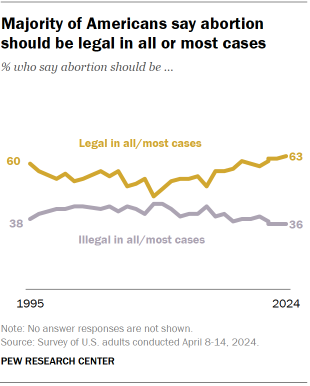
About six-in-ten (63%) say abortion should be legal in all or most cases. This share has grown 4 percentage points since 2021 – the year prior to the 2022 decision in Dobbs v. Jackson Women’s Health Organization that overturned Roe.
The new Pew Research Center survey, conducted April 8-14, 2024, among 8,709 adults, surfaces ongoing – and often partisan – divides over abortion attitudes:
- Democrats and Democratic-leaning independents (85%) overwhelmingly say abortion should be legal in all or most cases, with near unanimous support among liberal Democrats.
- By comparison, Republicans and Republican leaners (41%) are far less likely to say abortion should be legal in all or most cases. However, two-thirds of moderate and liberal Republicans still say it should be.
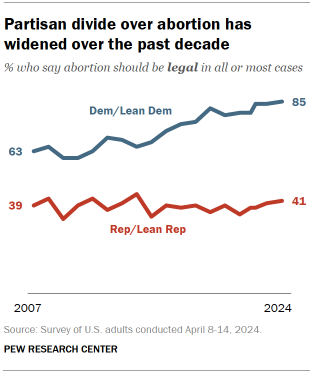
Since before Roe was overturned, both parties have seen a modest uptick in the share who say abortion should be legal.
As in the past, relatively few Americans (25%) say abortion should be legal in all cases, while even fewer (8%) say it should be illegal in all cases. About two-thirds of Americans do not take an absolutist view: 38% say it should be legal in most cases, and 28% say it should be illegal in most cases.
Related: Americans overwhelmingly say access to IVF is a good thing
Women’s abortion decisions
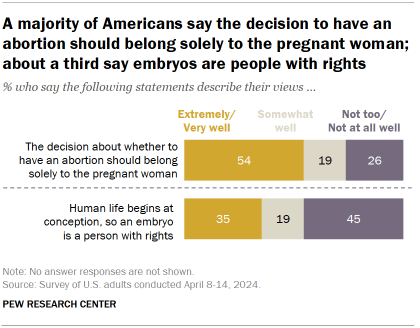
A narrow majority of Americans (54%) say the statement “the decision about whether to have an abortion should belong solely to the pregnant woman” describes their views extremely or very well. Another 19% say it describes their views somewhat well, and 26% say it does not describe their views well.
Views on an embryo’s rights
About a third of Americans (35%) say the statement “human life begins at conception, so an embryo is a person with rights” describes their views extremely or very well, while 45% say it does not describe their views well.
But many Americans are cross-pressured in their views: 32% of Americans say both statements about women’s decisions and embryos’ rights describe their views at least somewhat well.
Abortion access
About six-in-ten Americans in both parties say getting an abortion in the area where they live would be at least somewhat easy, compared with four-in-ten or fewer who say it would be difficult.
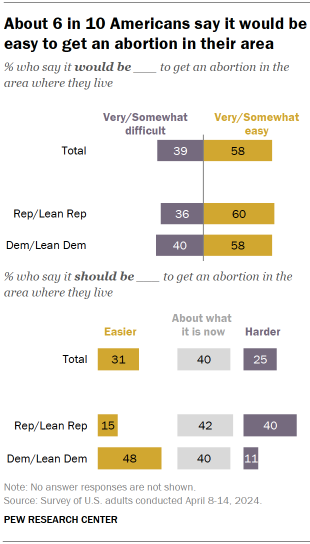
However, U.S. adults are divided over whether getting an abortion should be easier or harder:
- 31% say it should be easier for someone to get an abortion in their area, while 25% say it should be harder. Four-in-ten say the ease of access should be about what it is now.
- 48% of Democrats say that obtaining an abortion should be easier than it is now, while just 15% of Republicans say this. Instead, 40% of Republicans say it should be harder (just 11% of Democrats say this).
As was the case last year, views about abortion access vary widely between those who live in states where abortion is legal and those who live in states where it is not allowed.
For instance, 20% of adults in states where abortion is legal say it would be difficult to get an abortion where they live, but this share rises to 71% among adults in states where abortion is prohibited.
Medication abortion
Americans say medication abortion should be legal rather than illegal by a margin of more than two-to-one (54% vs. 20%). A quarter say they are not sure.
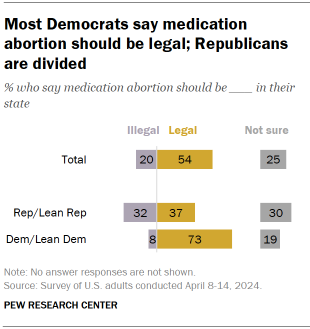
Like opinions on the legality of abortion overall, partisans differ greatly in their views of medication abortion:
- Republicans are closely split but are slightly more likely to say it should be legal (37%) than illegal (32%). Another 30% aren’t sure.
- Democrats (73%) overwhelmingly say medication abortion should be legal. Just 8% say it should be illegal, while 19% are not sure.
Across most other demographic groups, Americans are generally more supportive than not of medication abortion.
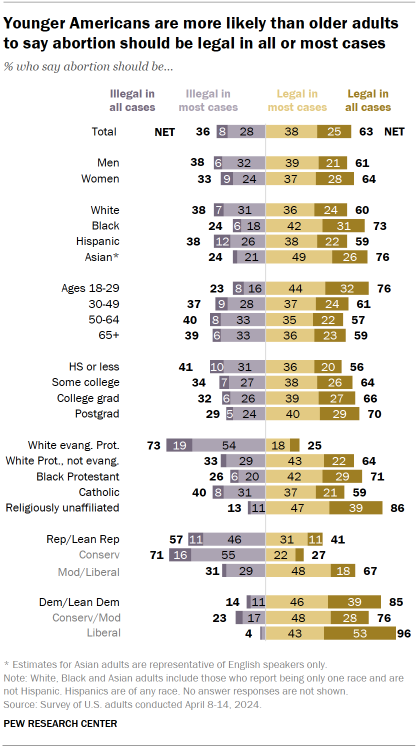
Across demographic groups, support for abortion access has changed little since this time last year.
Today, roughly six-in-ten (63%) say abortion should be legal in all (25%) or most (38%) cases. And 36% say it should be illegal in all (8%) or most (28%) cases.
While differences are only modest by gender, other groups vary more widely in their views.
Race and ethnicity
Support for legal abortion is higher among Black (73%) and Asian (76%) adults compared with White (60%) and Hispanic (59%) adults.
Compared with older Americans, adults under 30 are particularly likely to say abortion should be legal: 76% say this, versus about six-in-ten among other age groups.
Those with higher levels of formal education express greater support for legal abortion than those with lower levels of educational attainment.
About two-thirds of Americans with a bachelor’s degree or more education (68%) say abortion should be legal in all or most cases, compared with six-in-ten among those without a degree.
White evangelical Protestants are about three times as likely to say abortion should be illegal (73%) as they are to say it should be legal (25%).
By contrast, majorities of White nonevangelical Protestants (64%), Black Protestants (71%) and Catholics (59%) say abortion should be legal. And religiously unaffiliated Americans are especially likely to say abortion should be legal (86% say this).
Partisanship and ideology
Democrats (85%) are about twice as likely as Republicans (41%) to say abortion should be legal in all or most cases.
But while more conservative Republicans say abortion should be illegal (76%) than legal (27%), the reverse is true for moderate and liberal Republicans (67% say legal, 31% say illegal).
By comparison, a clear majority of conservative and moderate Democrats (76%) say abortion should be legal, with liberal Democrats (96%) overwhelmingly saying this.
Views of abortion access by state
About six-in-ten Americans (58%) say it would be easy for someone to get an abortion in the area where they live, while 39% say it would be difficult.
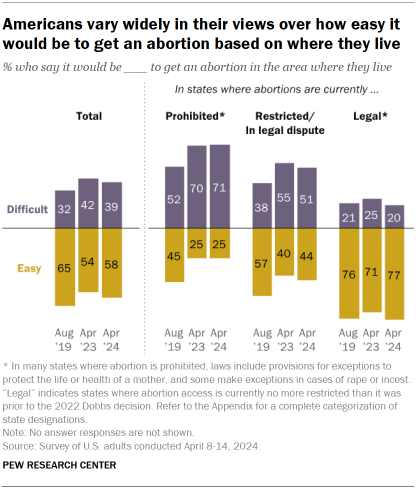
This marks a slight shift since last year, when 54% said obtaining an abortion would be easy. But Americans are still less likely than before the Dobbs decision to say obtaining an abortion would be easy.
Still, Americans’ views vary widely depending on whether they live in a state that has banned or restricted abortion.
In states that prohibit abortion, Americans are about three times as likely to say it would be difficult to obtain an abortion where they live as they are to say it would be easy (71% vs. 25%). The share saying it would be difficult has risen 19 points since 2019.
In states where abortion is restricted or subject to legal challenges, 51% say it would be difficult to get an abortion where they live. This is similar to the share who said so last year (55%), but higher than the share who said this before the Dobbs decision (38%).
By comparison, just 20% of adults in states where abortion is legal say it would be difficult to get one. This is little changed over the past five years.
Americans’ attitudes about whether it should be easier or harder to get an abortion in the area where they live also varies by geography.
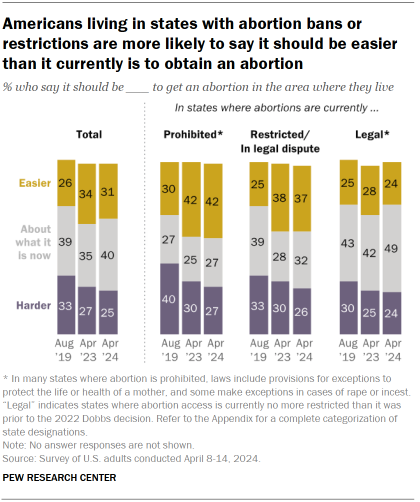
Overall, a decreasing share of Americans say it should be harder to obtain an abortion: 33% said this in 2019, compared with 25% today.
This is particularly true of those in states where abortion is now prohibited or restricted.
In both types of states, the shares of Americans saying it should be easier to obtain an abortion have risen 12 points since before Roe was overturned, as the shares saying it should be harder have gradually declined.
By comparison, changes in views among those living in states where abortion is legal have been more modest.
While Americans overall are more supportive than not of medication abortion (54% say it should be legal, 20% say illegal), there are modest differences in support across groups:
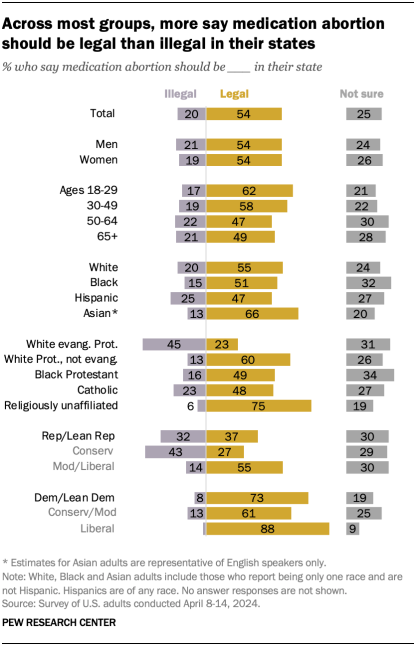
- Younger Americans are somewhat more likely to say medication abortion should be legal than older Americans. While 59% of adults ages 18 to 49 say it should be legal, 48% of those 50 and older say the same.
- Asian adults (66%) are particularly likely to say medication abortion should be legal compared with White (55%), Black (51%) and Hispanic (47%) adults.
- White evangelical Protestants oppose medication abortion by about two-to-one (45% vs. 23%), with White nonevangelicals, Black Protestants, Catholics and religiously unaffiliated adults all being more likely than not to say medication abortion should be legal.
- Republicans are closely divided over medication abortion: 37% say it should be legal while 32% say it should be illegal. But similar to views on abortion access overall, conservative Republicans are more opposed (43% illegal, 27% legal), while moderate and liberals are more supportive (55% legal, 14% illegal).
Just over half of Americans (54%) say “the decision about whether to have an abortion should belong solely to the pregnant woman” describes their views extremely or very well, compared with 19% who say somewhat well and 26% who say not too or not at all well.
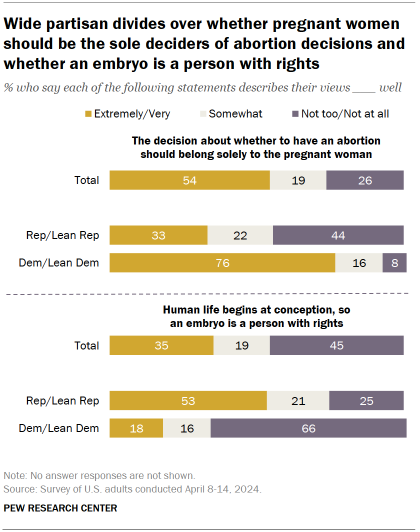
Democrats (76%) overwhelmingly say this statement describes their views extremely or very well, with just 8% saying it does not describe their views well.
Republicans are more divided: 44% say it does not describe their views well while 33% say it describes them extremely or very well. Another 22% say it describes them somewhat well.
Fewer Americans (35%) say the statement “human life begins at conception, so an embryo is a person with rights” describes their views extremely or very well. Another 19% say it describes their views somewhat well while 45% say it describes them not too or not at all well.
(The survey asks separately whether “a fetus is a person with rights.” The results are roughly similar: 37% say that statement describes their views extremely or very well.)
Republicans are about three times as likely as Democrats to say “an embryo is a person with rights” describes their views extremely or very well (53% vs. 18%). In turn, Democrats (66%) are far more likely than Republicans (25%) to say it describes their views not too or not at all well.
Some Americans are cross-pressured about abortion
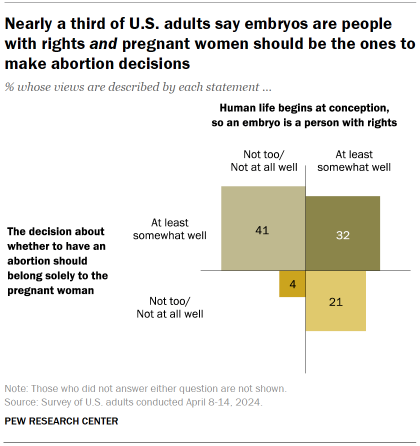
When results on the two statements are combined, 41% of Americans say the statement about a pregnant woman’s right to choose describes their views at least somewhat well , but not the statement about an embryo being a person with rights. About two-in-ten (21%) say the reverse.
But for nearly a third of U.S. adults (32%), both statements describe their views at least somewhat well.
Just 4% of Americans say neither statement describes their views well.
Sign up for our weekly newsletter
Fresh data delivery Saturday mornings
Sign up for The Briefing
Weekly updates on the world of news & information
- Partisanship & Issues
Support for legal abortion is widespread in many places, especially in Europe
Public opinion on abortion, americans overwhelmingly say access to ivf is a good thing, what the data says about abortion in the u.s., nearly a year after roe’s demise, americans’ views of abortion access increasingly vary by where they live, most popular, report materials.
1615 L St. NW, Suite 800 Washington, DC 20036 USA (+1) 202-419-4300 | Main (+1) 202-857-8562 | Fax (+1) 202-419-4372 | Media Inquiries
Research Topics
- Age & Generations
- Coronavirus (COVID-19)
- Economy & Work
- Family & Relationships
- Gender & LGBTQ
- Immigration & Migration
- International Affairs
- Internet & Technology
- Methodological Research
- News Habits & Media
- Non-U.S. Governments
- Other Topics
- Politics & Policy
- Race & Ethnicity
- Email Newsletters
ABOUT PEW RESEARCH CENTER Pew Research Center is a nonpartisan fact tank that informs the public about the issues, attitudes and trends shaping the world. It conducts public opinion polling, demographic research, media content analysis and other empirical social science research. Pew Research Center does not take policy positions. It is a subsidiary of The Pew Charitable Trusts .
Copyright 2024 Pew Research Center

IMAGES
VIDEO
COMMENTS
See our list of political communication research paper topics. Communication is considered to be 'political' if it relates to the exchange of messages among political actors. For example, most of what politicians do is political communication. Likewise, citizens communicate politics when they discuss political issues with friends or family ...
The Communication Department is home to the world's leading scholars studying political communication. The area focuses on how communication and media affect political attitudes and behaviors, as well as what communication reveals about the workings of political institutions and political systems. The area is also known for its innovation in ...
Moreover, empirical research on political communication within the Quarterly is far from uniform, instead drawing from a range of theories, methods, and topics. The latter encompass everything from social media and partisanship to political knowledge and political news, with a notable emphasis on the "media" aspect of "politics and media."
Ranked 5/94 in Communication and 3/182 in Political Science. Political Communication is an international journal, published quarterly, that features cutting-edge theory-driven empirical research at the intersection of politics and communication. Its expansive subject is the site of rapid changes and pressing policy concerns worldwide.
Political Communication. Politics depends heavily on communication among and between political elites, the media, and citizens. Scholars at Annenberg examine the role of interpersonal and mass-mediated communication on the attitudes, opinions, information-processing, and behavior of citizens, political elites, political institutions, and ...
The goal of the current research was to examine all research articles relevant to the role of (social) media in political polarization. We theorized that researchers from various fields (e.g. political communication, political science, and psychology) have examined this topic.
This comprehensive review of the political communication literature is designed to become the first reference for scholars and students interested in the study of how, why, when, and with what effect humans make sense of symbolic exchanges about sharing and shared power. Keywords: political communication, political theory, mass media and ...
Political Communication. P. Norris, in International Encyclopedia of the Social & Behavioral Sciences, 2001 3 Effects. Lastly perhaps the largest body of research, certainly in the USA, has focused at individual level on the study of the potential effects of exposure to different types of political communication messages. The most common method has been to draw upon cross-sectional or panel ...
Against this background, political communication scholars have explored two overarching research questions related to the normative role of social media in politics: first, whether social media increases democratic engagement, such as voting in elections or other forms of political participation (Boulianne, Citation 2020), and second, to what ...
Understanding how power is exercised through communication is central to understanding the socio-political world around us. To date, however, political communication research has been limited by an over-emphasis on 'problem solving' research which, by and large, reflects the interests and concerns of more powerful political actors. Even the marginalized critical political communication ...
Good political communication research, Parry-Giles and Parry-Giles (2001) concluded, should "not blithely accept political discourse or praise its quality," but rather, it should critically bring to the fore the communicative processes through which politics is conducted. ... Topics in Political Communication. Presidential Communication ...
Highlighting innovative research topics on an international scale, such as electron campaigns, social justice, and protests, this book is ideally designed for academics, professionals, practitioners, graduate students, and researchers interested in discovering how musical expression is shaping the realm of political communication.
In recent years, social media are said to have an impact on the public discourse and communication in the society. In particular, social media are increasingly used in political context. More recently, microblogging services (e.g., Twitter) and social network sites (e.g., Facebook) are believed to have the potential for increasing political participation. While Twitter is an ideal platform for ...
Categorization of topic Figure 8 shows the four main topics that form the basis of the discussion of the theme of research on political communication in social media from Scopus-indexed articles ...
Given the vast attention to and interest in the pandemic and the need for thorough analysis of the risk perceptions and communication about SARS-CoV-2, this Research Topic aims to analyze the political and politicized discourses surrounding COVID-19. The misperceptions of risk have, in some cases, led to increased fatalities and pathogenic ...
Research Topic: Political Communication. 2 Items ... Publication: Mass Communication Research Co-authors: Francis Lee, Chinese University of Hong Kong; Ping Shaw, National Sun Yat-sen University. International Communication Political Communication October 30, 2023 Populist Candidate in Polarizing Media and Election Full title: The "populist ...
Her primary research focuses on interpersonal communication, deliberation, as well as political offline and online communication. Her work has been published in International Journal of Public Opinion Research, International Journal of Public Opinion Research, Journalism & Mass Communication Quarterly , and Communications—The European Journal ...
Despite its key importance for 21st-century politics, the study of government communication is an under-researched area of political communication studies, finding itself in a kind of theoretical no-man's land between political communication, public relations and organizational communication research.
Here, we'll explore a variety of politically-related research ideas across a range of disciplines, including political theory and philosophy, comparative politics, international relations, public administration and policy. NB - This is just the start…. The topic ideation and evaluation process has multiple steps.
Over 130 studies have examined the relationship between interpersonal political discussion and political knowledge, generally finding that discussion can increase people's level of political knowledge (Amsalem & Nir, 2019). ... Related Topics. Moore R.C. Human Communication Research ... 2009, Hancock J.T., Human Communication Research ...
199 communication research topics Here are some examples of communication research topics for different career fields and areas of academic study: Journalism research topics. Emerging spaces in journalism; People-powered journalism; Globalization and journalism; Journalism and social-political conflict; Science and the pursuit of truth in ...
Political Communication, Volume 41, Issue 3 (2024) See all volumes and issues. ... Research Article. Article. Discourse Networks of the Far Right: How Far-Right Actors Become Mainstream in Public Debates. Teresa Völker & Daniel Saldivia Gonzatti. Pages: 353-372. Published online: 22 Feb 2024.
Topics in Political communication explored in Political Communication were investigated in conjunction with research in Scholarship, Political economy, Computational sociology and Public relations. The research on Scholarship tackled can also make contributions to studies in the areas of Social psychology, Moderation, Mediation, State (polity ...
A Stanford-led study into how quitting social media affected users' political views in the runup to the 2020 presidential vote has implications for this year's election. Facebook went away. Political divides didn't budge. | Stanford Institute for Economic Policy Research (SIEPR)
In one experiment, 505 Americans from different political parties evaluated a series of posts on the social media platform X by members of the U.S. House of Representatives.
This is especially the case when it comes to emotionally charged political topics," said Knöchelmann. "Our research now shows that intellectual humility can help to make people more willing to engage with others." Articles: "Using 'Balanced Pragmatism' in Political Discussions Increases Cross-Partisan Respect," by Curtis Puryear ...
Fewer people now say they prefer to get local news through a television set (32%, down from 41% who said the same in 2018). Americans are now more likely to say they prefer to get local news online, either through news websites (26%) or social media (23%). Both of these numbers have increased in recent years. Smaller shares prefer getting their ...
About four-in-ten Americans say it is at least somewhat important that they get news from journalists who share their political views (39%). That is nearly double the share who say the same about getting news from journalists who share their religious views (22%) or who talk or sound like them (20%).. Smaller shares say they want to get news from journalists who are similar to them in age (15% ...
Nearly two years after the Supreme Court overturned the 1973 Roe v. Wade decision guaranteeing a national right to abortion, a majority of Americans continue to express support for abortion access. About six-in-ten (63%) say abortion should be legal in all or most cases. This share has grown 4 percentage points since 2021 - the year prior to ...